人力资源管理专业词汇(DOC 29页)
- 格式:doc
- 大小:218.00 KB
- 文档页数:31
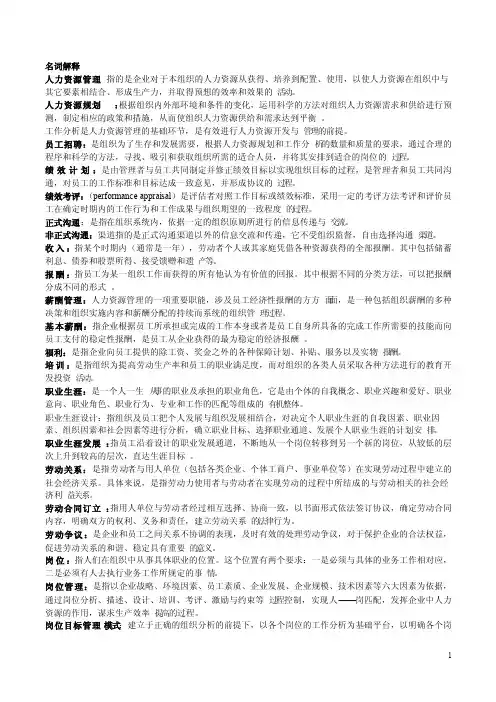
名词解释人力资源管理:指的是企业对于本组织的人力资源从获得、培养到配置、使用,以使人力资源在组织中与其它要素相结合、形成生产力,并取得预想的效率和效果的活动。
人力资源规划:根据组织内外部环境和条件的变化,运用科学的方法对组织人力资源需求和供给进行预测,制定相应的政策和措施,从而使组织人力资源供给和需求达到平衡。
工作分析是人力资源管理的基础环节,是有效进行人力资源开发与管理的前提。
员工招聘:是组织为了生存和发展需要,根据人力资源规划和工作分析的数量和质量的要求,通过合理的程序和科学的方法,寻找、吸引和获取组织所需的适合人员,并将其安排到适合的岗位的过程。
绩效计划:是由管理者与员工共同制定并修正绩效目标以实现组织目标的过程,是管理者和员工共同沟通,对员工的工作标准和目标达成一致意见,并形成协议的过程。
绩效考评:(perform ance apprais al)是评估者对照工作目标或绩效标准,采用一定的考评方法考评和评价员工在确定时期内的工作行为和工作成果与组织期望的一致程度的过程。
正式沟通:是指在组织系统内,依据一定的组织原则所进行的信息传递与交流。
非正式沟通:渠道指的是正式沟通渠道以外的信息交流和传递,它不受组织监督,自由选择沟通渠道。
收入:指某个时期内(通常是一年),劳动者个人或其家庭凭借各种资源获得的全部报酬。
其中包括储蓄利息、债券和股票所得、接受馈赠和遗产等。
报酬:指员工为某一组织工作而获得的所有他认为有价值的回报。
其中根据不同的分类方法,可以把报酬分成不同的形式。
薪酬管理:人力资源管理的一项重要职能,涉及员工经济性报酬的方方面面,是一种包括组织薪酬的多种决策和组织实施内容和薪酬分配的持续而系统的组织管理过程。
基本薪酬:指企业根据员工所承担或完成的工作本身或者是员工自身所具备的完成工作所需要的技能而向员工支付的稳定性报酬,是员工从企业获得的最为稳定的经济报酬。
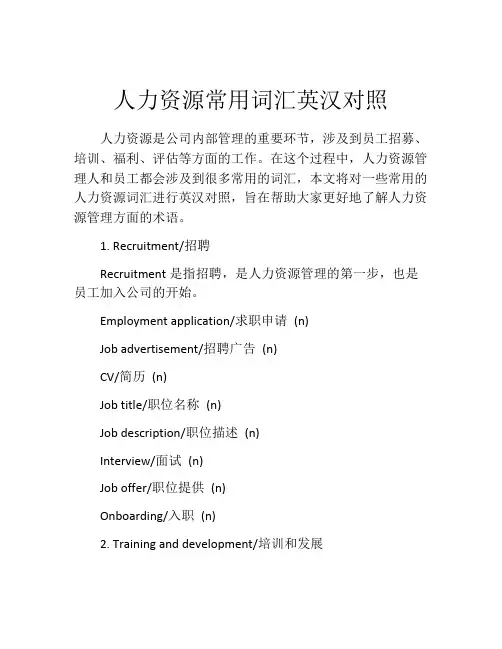
人力资源常用词汇英汉对照人力资源是公司内部管理的重要环节,涉及到员工招募、培训、福利、评估等方面的工作。
在这个过程中,人力资源管理人和员工都会涉及到很多常用的词汇,本文将对一些常用的人力资源词汇进行英汉对照,旨在帮助大家更好地了解人力资源管理方面的术语。
1. Recruitment/招聘Recruitment是指招聘,是人力资源管理的第一步,也是员工加入公司的开始。
Employment application/求职申请(n)Job advertisement/招聘广告(n)CV/简历(n)Job title/职位名称(n)Job description/职位描述(n)Interview/面试(n)Job offer/职位提供(n)Onboarding/入职(n)2. Training and development/培训和发展Training and development是指为新老员工提供相关的技能和知识,帮助员工学习和发展,最终增强公司的工作效率和竞争力。
On-job training/在职培训(n)Off-job training/在职培训(n)Training needs analysis/培训需求分析(n)Training program/培训计划(n)Training session/培训课程(n)Skill enhancement/技能提升(n)Professional development/职业发展(n)Management development/管理发展(n)3. Performance management/绩效管理Performance management是指通过设定明确的目标和标准,评估员工的工作表现和绩效,并制定相应的奖惩措施和发展计划。
Performance appraisal/绩效评估(n)Key performance indicator/关键绩效指标(n)Objective setting/目标设定(n)Performance review/绩效回顾(n)Performance feedback/绩效反馈(n)Performance improvement plan/绩效改进计划(n)Performance bonus/绩效奖金(n)Performance warning/绩效警告(n)4. Compensation and benefits/薪酬和福利Compensation and benefits是指为员工提供合理的薪酬和福利,以吸引和留住人才。
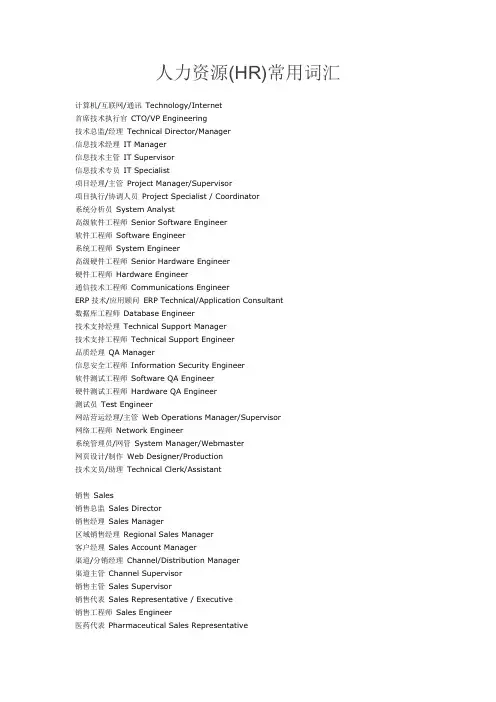
人力资源(HR)常用词汇计算机/互联网/通讯Technology/Internet首席技术执行官CTO/VP Engineering技术总监/经理Technical Director/Manager信息技术经理IT Manager信息技术主管IT Supervisor信息技术专员IT Specialist项目经理/主管Project Manager/Supervisor项目执行/协调人员Project Specialist / Coordinator系统分析员System Analyst高级软件工程师Senior Software Engineer软件工程师Software Engineer系统工程师System Engineer高级硬件工程师Senior Hardware Engineer硬件工程师Hardware Engineer通信技术工程师Communications EngineerERP技术/应用顾问ERP Technical/Application Consultant数据库工程师Database Engineer技术支持经理Technical Support Manager技术支持工程师Technical Support Engineer品质经理QA Manager信息安全工程师Information Security Engineer软件测试工程师Software QA Engineer硬件测试工程师Hardware QA Engineer测试员Test Engineer网站营运经理/主管Web Operations Manager/Supervisor网络工程师Network Engineer系统管理员/网管System Manager/Webmaster网页设计/制作Web Designer/Production技术文员/助理Technical Clerk/Assistant销售Sales销售总监Sales Director销售经理Sales Manager区域销售经理Regional Sales Manager客户经理Sales Account Manager渠道/分销经理Channel/Distribution Manager渠道主管Channel Supervisor销售主管Sales Supervisor销售代表Sales Representative / Executive销售工程师Sales Engineer医药代表Pharmaceutical Sales Representative保险代理Insurance Agent销售助理Sales Assistant / Trainee商务经理Business Manager商务专员/助理Business Executive/Assistant销售行政经理Sales Admin. Manager销售行政主管Sales Admin. Supervisor售前/售后技术服务经理Technical Service Manager售前/售后技术服务主管Technical Service Supervisor售前/售后技术服务工程师Technical Service Engineer售后/客户服务(非技术)经理Customer Service Manager售后/客户服务(非技术)主管Customer Service Supervisor 售后/客户服务(非技术)专员Customer Service Executive经销商Distributor市场/公关/广告Marketing/PR/Advertising市场/广告总监Marketing/Advertising Director/VP市场/营销经理Marketing Manager市场/营销主管Marketing Supervisor市场/营销专员Marketing Executive/Communication市场助理Marketing Assistant / Trainee产品/品牌经理Product/Brand Manager产品/品牌主管Product/Brand Supervisor市场通路经理Trade Marketing Manager市场通路主管Trade Marketing Supervisor促销经理Promotions Manager促销主管Promotions Supervisor促销员Promotions Specialist市场分析/调研人员Market Analyst/ Research Analyst公关/会务经理Public Relations Manager公关/会务主管Public Relations Supervisor公关/会务专员Public Relations Executive媒介经理Media Manager媒介人员Media Specialist企业/业务发展经理Business Development Manager企业策划人员Corporate Planning广告策划/设计/文案Advertising Creative/Design/Copy writer [ 本帖最后由Libya2019 于2006-3-5 14:47 编辑]财务/审计/统计/金融Finance/Accounting/Banking财务总监CFO/Finance Director/VP财务经理Finance Manager财务主管/总帐主管Finance Supervisor会计经理/会计主管Accounting Manager/Supervisor会计Accountant / Accounting Trainee出纳员Cashier财务/会计助理Finance/Accounting Assistant财务分析经理/主管Financial Analysis Manager/Supervisor财务分析员Financial Analyst成本经理/成本主管Cost Accounting Manager/Supervisor成本管理员Cost Accounting Specialist审计经理/主管Audit Manager/Supervisor审计专员/助理Audit Executive/Assistant税务经理/税务主管Tax Manager/Supervisor税务专员Tax Executive证券经纪人Stock Broker投资顾问Investment Advisor注册分析师Certified Investment/Financial Analyst投资/基金项目经理Investment Manager融资经理/融资主管Treasury Manager/Supervisor融资专员Treasury Specialist行长/副行长President/Vice-President/Branch Manager风险控制Risk Management进出口/信用证结算Trading / LC Officer清算人员Settlement Officer外汇主管Foreign Exchange Supervisor高级客户经理/客户经理Senior Relationship Manager客户主管/专员Relationship?Supervisor/Executive信贷/信用调查/分析人员Loan/Credit Officer银行柜台出纳Bank Teller统计员Statistician生产/营运/工程Manufacturing/Operations/Engineering工厂经理/厂长Plant/Factory Manager总工程师/副总工程师Chief Engineer项目经理/主管Project Manager/Supervisor项目工程师Project Engineer营运经理Operations Manager营运主管Operations Supervisor生产经理/车间主任Production Manager/Workshop Supervisor 生产计划协调员Production Planning Executive/Officer生产主管/督导/领班Production Supervisor/Team Leader技术/工艺设计经理/主管Technical/Industrial Design Mgr./Spvr. 技术/工艺设计工程师Technical/Industrial Design Engineer实验室负责人/工程师Lab Manager/Engineer工程/设备经理Engineering/Facility Manager工程/设备主管Engineering/Facility Supervisor工程/设备工程师Engineering/Facility Engineer电气/电子工程师Electrical/Electronics Engineer机械工程师Mechanical Engineer机电工程师Electrical & Mechanical Engineer维修工程师Maintenance Engineer质量经理QA Manager质量主管QA Supervisor质量工程师QA Engineer质量检验员/测试员QA Inspector认证工程师Certification Engineer安全/健康/环境经理/主管Safety/Health/Environment Manager/Supervisor 安全/健康/环境工程师Safety/Health/Environment Engineer工程绘图员Project Drafting Specialist机械制图员Drafting Specialist化验员Laboratory Technician技工Technician / Engineer Trainee电工Electrician服装打样/制版Clothing/Apparel Sample Production行政/人事/后勤Admin./HR/Support Services行政/人事总监Admin/Human Resources Director人事经理Human Resources Manager人事主管Human Resources Supervisor人事专员Human Resources Specialist人事助理Human Resources Assistant招聘经理/主管Recruiting Manager/Supervisor薪资福利经理/主管Compensation & Benefits Mgr./Supervisor薪资福利专员/助理Compensation & Benefits Specialist/Assistant培训经理/主管Training Manager/Supervisor培训专员/助理Training Specialist/Assistant行政经理/主管/办公室主任Admin Manager/Supervisor/Office Manager行政专员/助理Admin Staff/Assistant经理助理/秘书Executive Assistant/Secretary前台接待/总机Receptionist后勤Office Support资料管理员Information / Data Management Specialist电脑操作员/打字员Computer Operator/Typist高级管理Senior Management首席执行官/总经理CEO/GM/President副总经理Deputy GM/VP/Management Trainee总监Director合伙人Partner总裁/总经理助理CEO/GM/President物流/贸易/采购Logis./Trading/Merchand./Purch.物流经理Logistics Manager物流主管Logistics Supervisor物流专员/助理Logistics Specialist/Assistant物料经理Materials Manager物料主管Materials Supervisor采购经理Purchasing Manager采购主管Purchasing Supervisor采购员Purchasing Specialist/Staff外贸/贸易经理/主管Trading Manager/Supervisor外贸/贸易专员/助理Trading Specialist/Assistant业务跟单经理Merchandiser Manager高级业务跟单Senior Merchandiser业务跟单Merchandiser助理业务跟单Assistant Merchandiser仓库经理/主管Warehouse Manager仓库管理员Warehouse Specialist运输经理/主管Distribution Manager/Supervisor报关员Customs Specialist单证员Documentation Specialist船务人员Shipping Specialist快递员Courier理货员Warehouse Stock Management文字/艺术/设计Writer/Editor/Creative Artist/Designer 编辑/作家/撰稿人Editor/Writer记者Journalist / Reporter校对/录入Proofreader/Data Entry Staff排版设计Layout Designer艺术/设计总监Creative/Design Director影视策划/制作人员Entertainment Planning / Production 导演Director摄影师Photographer音效师Recording / Sounds Specialist演员/模特/主持人Actor/Actress/Model/MC平面设计/美术设计Graphic Artist/Designer纺织/服装设计Clothing / Apparel Designer工业/产品设计Industrial Designer工艺品/珠宝设计Artwork/Jewelry Designer科研人员Research Specialist Staff科研管理人员Research Management科研人员Research Specialist Staff律师/法务Legal律师Lawyer法务人员Legal Personnel律师助理Paralegal/Legal Assistant书记员Court Clerk教师Professor/Teacher教师ProfessorTeacher教学/教务管理人员Education/School Administrator 助教Teaching Assistant讲师Lecturer家教Tutor医疗/护理Medicine / Nursing医生(中、西医)Medical Doctor医学管理人员Healthcare / Medical Management医药技术人员Medical Technician药库主任/药剂师Pharmacist护士/护理人员Nurse / Nursing Personnel临床协调员Clinical Coodinator临床研究员Clinical Researcher麻醉师Anesthesiologist心理医生Psychologist/Psychiatrist医药学检验Clinical Laboratory咨询/顾问Consultant专业顾问Senior Consultant咨询总监Consulting Director / Partner咨询经理Consulting Manager咨询员Consultant公务员Official在校学生Student应届毕业生Graduating Student实习生Intern/Trainee培训生Trainee服务Service美容/健身顾问Exercise Coach/Fitness Trainer餐饮/娱乐经理Banquet Services Manager宾馆/酒店经理Reception Manager领班Supervisor服务员Service Staff营业员/收银员/理货员Shop Clerk/Salesperson厨师Chief/Cook导游Tour Guide司机Chauffeur/Driver保安Security寻呼员/话务员Paging Operator建筑/房地产Construction/Real Estate建筑工程师Architect结构/土建工程师Structural Engineer电气工程师Electrical Engineer给排水/暖通工程师Drainage/HVAC Engineer工程造价师/预结算Budgeting Specialist建筑工程管理Construction Management工程监理Engineering Project Supervisor室内外装潢设计Decorator城市规划与设计Urban Design/Planning建筑制图CAD Drafter施工员Construction Crew房地产开发/策划Real Estate Development/Planning 房地产评估Real Estate Appraisal房地产中介/交易Real Estate Agent/Broker物业管理Property Management标准化standardization)有效性validity)客观性objectivity)规范norm)录用分数线cutoff score)准确度aiming)业务知识测试job knowledge tests)求职面试employment interview)非结构化面试unstructured interview)结构化面试structured interview)小组面试group interview)职业兴趣测试vocational interest tests)会议型面试board interview)人力资源开发Human Resource Development,HRD) 培训training)开发development)定位orientation)训练coaching)辅导mentoring)经营管理策略business games)案例研究case study)会议方法conference method)角色扮演role playing)工作轮换job rotating)在职培训on-the-job training ,OJT)媒介media)企业文化corporate culture)组织发展organization development,OD)调查反馈survey feedback)质量圈quality circles)目标管理management by objective,MBO)全面质量管理Total Quality Management,TQM)团队建设team building)职业career)职业计划career planning)职业道路career path)职业发展career development)自我评价self-assessment)职业动机career anchors)绩效评价Performance Appraisal,PA)小组评价group appraisal)业绩评定表rating scales method)关键事件法critical incident method)排列法ranking method)平行比较法paired comparison)硬性分布法forced distribution method)晕圈错误halo error)宽松leniency)严格strictness)叙述法essay method)集中趋势central tendency)报酬compensation)直接经济报酬direct financial compensation)间接经济报酬indirect financial compensation)非经济报酬no financial compensation)公平equity)外部公平external equity)内部公平internal equity)员工公平employee equity)小组公平team equity)工资水平领先者pay leaders)现行工资率going rate)工资水平居后者pay followers)劳动力市场labor market)工作评价job evaluation)排列法ranking method)分类法classification method)因素比较法factor comparison method)评分法point method)海氏指示图表个人能力分析法Hay Guide Chart-profile Method) 工作定价job pricing)工资等级pay grade)工资曲线wage curve)工资幅度pay range)员工股权计划employee stock ownership plan,ESOP)值班津贴shift differential)奖金incentive compensation)分红制profit sharing)安全safety)健康health)频率frequency rate)紧张stress)角色冲突role conflict)催眠法hypnosis)酗酒alcoholism)工会union)地方工会local union)行业工会craft union)产业工会industrial union)全国工会national union)谈判组bargaining union)劳资谈判collective bargaining)仲裁arbitration)罢工strike)内部员工关系internal employee relations) 纪律discipline)纪律处分disciplinary action)申诉grievance)降职demotion)调动transfer)晋升promotion)。
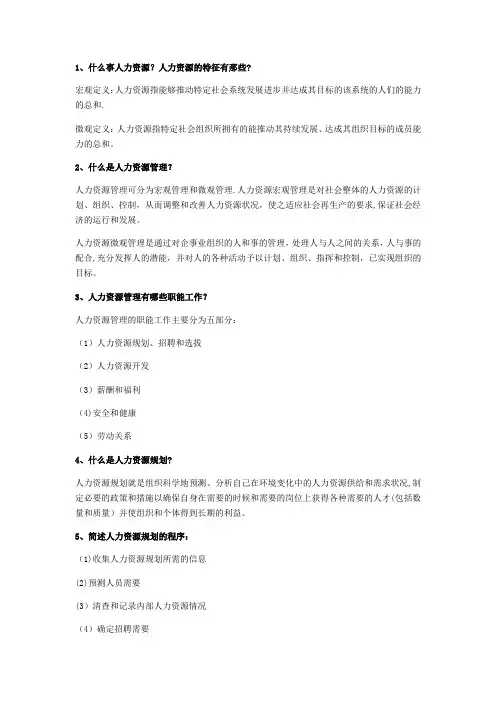
1、什么事人力资源?人力资源的特征有那些?宏观定义:人力资源指能够推动特定社会系统发展进步并达成其目标的该系统的人们的能力的总和.微观定义:人力资源指特定社会组织所拥有的能推动其持续发展、达成其组织目标的成员能力的总和。
2、什么是人力资源管理?人力资源管理可分为宏观管理和微观管理.人力资源宏观管理是对社会整体的人力资源的计划、组织、控制,从而调整和改善人力资源状况,使之适应社会再生产的要求,保证社会经济的运行和发展。
人力资源微观管理是通过对企事业组织的人和事的管理,处理人与人之间的关系,人与事的配合,充分发挥人的潜能,并对人的各种活动予以计划、组织、指挥和控制,已实现组织的目标。
3、人力资源管理有哪些职能工作?人力资源管理的职能工作主要分为五部分:(1)人力资源规划、招聘和选拔(2)人力资源开发(3)薪酬和福利(4)安全和健康(5)劳动关系4、什么是人力资源规划?人力资源规划就是组织科学地预测、分析自己在环境变化中的人力资源供给和需求状况,制定必要的政策和措施以确保自身在需要的时候和需要的岗位上获得各种需要的人才(包括数量和质量)并使组织和个体得到长期的利益。
5、简述人力资源规划的程序:(1)收集人力资源规划所需的信息(2)预测人员需要(3)清查和记录内部人力资源情况(4)确定招聘需要(5)与其他规划协调(6)评估人力资源规划6、什么是职位分析?职务分析又称工作分析,是全面了解一项职务的管理活动,也是对该项职务的工作内容和职务规范(任职资格)的描述和研究过程,即制定职务描述书(一班包括职务说明和职务规范两个部分)的系统过程。
具体地讲,职务分析就是全面收集某一直无的有关信息,对该工作从6个方面开展调查研究:工作内容(What)、责任者(Who)、工作岗位(Where)、工作时间(When)、怎样操作(How),以及为何要这样做(Why)等,然后再将该职务的任务要求进行书面描述、整理成文的过程。
7、职位分析的主要方法有哪些?一、工作实践法优点:1、可以了解工作的实际任务以及该工作对人的体力、环境、社会等方面的要求2、观察、记录与核实工作负荷与工作条件3、观察、记录、分析工作流程及工作方法,找出不合理之处缺点:适用于短期内可以掌握的工作,而对于需要大量训练才能掌握或有危险的工作,不宜采用此法,如飞行员的工作,脑外科医生、战地记者二、访谈法【个别访谈法(individual interview),集体访谈法(group interview),主管访谈法(supervisor interview)】优点:1、一种被广泛采用进行工作分析的方法,尤其是用来达到编制工作描述的目的;2、经常被作为其他信息收集方法的辅助,如当问卷填写不清楚、观察员工工作时存在问题等;缺点:对访谈者技巧要求高,如运用不当可能影响信息收集的质量;不能作为工作分析的唯一方法三、观察法1、被观察者的工作应相对稳定、工作场所也应相对固定,这样便于观察2、适用于大量标准化的、周期较短的以体力活动为主的工作如组装线工人、会计员,而不适用于脑力活动为主的工作如律师、设计工程师等工作3、观察者尽可能不要引起被观察者的注意,也不要干扰被观察者的工作,否则可能引起霍桑效应4、对于不能通过观察法得到的信息,应辅以其他形式如访谈法来获得5、观察前要有详细的观察提纲6、可以采用瞬间观察,也可以定时观察四、问卷调查法优点:1、能够从众多员工处迅速得到信息,节省时间和人力,费用低2、员工填写工作信息的时间较为宽裕,不会影响工作时间3、适用于在短时间内对大量人员进行调查的情形4、结构化问卷所得到的结果可由计算机处理缺点:1、问卷的设计需要花费时间、人力和物力,费用较高2、单向沟通方式,所提问题可能部分地不为员工理解3、可能造成,填写者不认真填写,影响调查的质量五、功能性职务分析法(FJA)六、资料分析法七、关键事件记录法:1、收集、整理导致某工作成功或失败的典型、重要的行为特征或事件2、它是在二战期间由John Flanagan开发出来用于识别各种军事环境下提高人绩效的关键性因素的手段和方法;Flanagan认为,关键事件法应对完成工作的关键性行为进行记录,以反映特别有效和特别无效的工作行为3、需要专业人员对“关键性事件和行为”进行信息收集、概括和分类;4、没有提供对工作全方位的描述和探察,主要应用于下述工作分析目的:绩效评价标准的建立、甄选标准的开发以及培训员工八、实验法九、工作秩序分析法十、工作日记法1、若运用得好,能获得大量的、更为准确的信息2、前期直接成本小3、收集信息可能较凌乱,整理工作复杂4、加大员工工作的负担5、也存在夸大自己工作重要性的倾向8、职位说明书包括哪些主要内容?答:(1)基本资料:岗位名称、岗位编号、岗位等级、定员标准、直接上级、分析日期.(2)岗位说明:工作日期、岗位关系、工作内容及要求、工作权限、工作环境及条件、工作时间。
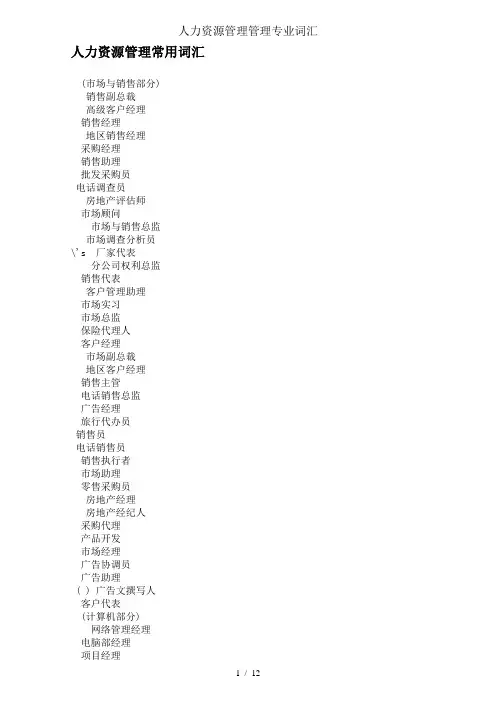
人力资源管理常用词汇(市场与销售部分)销售副总裁高级客户经理销售经理地区销售经理采购经理销售助理批发采购员电话调查员房地产评估师市场顾问市场与销售总监市场调查分析员\'s 厂家代表分公司权利总监销售代表客户管理助理市场实习市场总监保险代理人客户经理市场副总裁地区客户经理销售主管电话销售总监广告经理旅行代办员销售员电话销售员销售执行者市场助理零售采购员房地产经理房地产经纪人采购代理产品开发市场经理广告协调员广告助理( ) 广告文撰写人客户代表(计算机部分)网络管理经理电脑部经理项目经理技术工程师开发工程师系统程序员局域网管理员操作分析电脑操作员产品支持经理电脑操作主管信息服务主管系统工程师硬件工程师应用软件程序员信息分析系统分析统计员(人力资源部分)人力资源总监人事助理薪酬经理招募顾问后勤经理人员配置专员劳动关系专员招聘人员培训专员人力资源副总裁人力资源副总裁助理职员经理员工福利协调员员工关系代表员工顾问培训协调员(管理部分)() 首席执行官运营总监副总裁部门经理零售店经理产品经理操作经理副总裁助理土地担保协调员管理顾问市区经理医院管理进出口经理保险认领管理员程序管理经理保险协调员项目经理库存管理经理区域经理() 首席运营官总经理市场行政总监() 国际监管食品服务经理生产经理医疗保险管理房地产经理主考官() 管理员服务经理制造业经理售买经理电信业经理运输经理仓库经理商店经理助理( ) 非盈利性慈善机构管理人力资源管理专业英语词汇一、人力资源管理:( )人力资源经理:( )高级管理人员:() / i`职业:()道德标准:()操作工:( )专家:()人力资源认证协会:( )二、外部环境:( )内部环境:( )政策:()企业文化:( )目标:()股东:()非正式组织:( )跨国公司:( )管理多样性:( )三、工作:()职位:()工作分析:( )工作说明:( )工作规范:( )工作分析计划表:( )职位分析问卷调查法:( ) 行政秘书:( )地区服务经理助理:( ) 四、人力资源计划:( )战略规划:( )长期趋势:( )要求预测:( )供给预测:( )管理人力储备:( )裁减:()人力资源信息系统:( ) 五、招聘:()员工申请表:( )招聘方法:( )内部提升:( )工作公告:( )广告:()职业介绍所:( )特殊事件:( )实习:()六、选择:()选择率:( )简历:()标准化:()有效性:()客观性:()规范:()录用分数线:( )准确度:()业务知识测试:( )求职面试:( )非结构化面试:( )结构化面试:( )小组面试:( )职业兴趣测试:( )会议型面试:( )七、组织变化与人力资源开发人力资源开发:( )培训:()开发:()定位:()训练:()辅导:()经营管理策略:( )案例研究:( )会议方法:( )角色扮演:( )工作轮换:( )在职培训:( )媒介:()八、企业文化与组织发展企业文化:( )组织发展:( )调查反馈:( )质量圈:( )目标管理:( )全面质量管理:( )团队建设:( )九、职业计划与发展职业:()职业计划:( )职业道路:( )职业发展:( )自我评价:()职业动机:( )十、绩效评价绩效评价:( )小组评价:( )业绩评定表:( )关键事件法:( )排列法:( )平行比较法:( )硬性分布法:( )晕圈错误:( )宽松:()严格:()3600反馈:(360 )叙述法:( )集中趋势:( )十一、报酬与福利报酬:()直接经济报酬:( )间接经济报酬:( )非经济报酬:( )公平:()外部公平:( )内部公平:( )员工公平:( )小组公平:( )工资水平领先者:( )现行工资率:( )工资水平居后者:( )劳动力市场:( )工作评价:( )排列法:( )分类法:( )因素比较法:( )评分法:( )海氏指示图表个人能力分析法:( )工作定价:( )工资等级:( )工资曲线:( )工资幅度:( )十二、福利和其它报酬问题福利(间接经济补偿)员工股权计划:( )值班津贴:( )奖金:( )分红制:( )十三、安全与健康的工作环境安全:()健康:()频率:( )紧张:()角色冲突:( )催眠法:()酗酒:()十四、员工和劳动关系工会:()地方工会:( )行业工会:( )产业工会:( )全国工会:( )谈判组:( )劳资谈判:( )仲裁:()罢工:()内部员工关系:( )纪律:()纪律处分:( )申诉:()降职:()调动:()晋升:()人力资源管理师(二级)专业英语词汇表1 可接受性2 成就测试3 行动计划4 行动步骤5 探险学习法6 负面影响7 工会代理制8 () 建设性争议解决方法9 分析法10 评价政治学11 学徒制12 仲裁13 评价14 评价中心15 态度认知与改变计划16 态度构建17 视听教学18 审计法19 综合评价卡20 基本技能21 行为改变计划22 行为模拟23 基准24 评判25 收益26 奖金27 联合抵制28 职业29 职业咨询30 ( ) 职业曲线(成熟曲线)31 职业管理系统32 职业支持33 集权化34 教练35 认知能力36 认知性结果37 劳资谈判过程38 演练小组39 比较比率40 报酬要素41 能力评估42 竞争优势43 集中战略44 同时效度45 , 消费者价格指数46 内容效度47 持续学习48 投入计划49 合作培训50 核心竞争力51 效标关联效度52 关键事件53 关键事件法54 跨文化准备55 交叉培训56 文化环境57 文化冲击58 顾客评估59 数据流程图60 数据库61 分散化62 决策支持系统63 养老金福利计划64 资方养老金投入计划65 扁平化66 沮丧67 开发规划系统68 差额计件工资69 直接成本70 纪律71 差别性影响72 差别性对待73 多元化培训74 精简75 降级76 效率工资理论77 () 电子绩效支持系统78 员工授权79 员工租借80 雇员调查与研究81 () 雇员健康修炼计划82 企业家83 () 公平就业机会84 书面方式85 道德86 外派雇员87 专家系统88 外部分析89 外边成长战略90 外部劳动力市场91 因素比较法92 反馈93 ( ) 灵活的福利计划(自助福利方案)94 灵活的时间95 (劳动力供求)预测96 正规教育计划97 参照系98 , 职能工作分析99 收益分享计划100 全球化101 目标102 目标和时间表103 图式评估法104 团队建设法105 群体指导计划106 海氏剖析法107 高层次培训108 高绩效工作系统109 计时工资制110 人力资本111 () 人力资源信息系统112 人力资源管理113 , 人力资源计划114 间接成本115 个人主义/集体主义116 投入117 指导性设计过程118 内部分析119 内部成长战略120 内部劳动力121 互联网122 实习计划123 面试124 组织内谈判125 工作分析126 工作分类法127 工作描述128 工作设计129 工作扩大化130 工作丰富化131 工作评价132 工作经验133 工作认同134 工作张贴和申请135 工作提升136 工作重要性排序法137 工作轮换138 工作满意度139 工作规范140 工作结构141 关键工作142 劳动力市场143 劳动关系进程144 无领导小组讨论法145 学习型组织146 长期-短期导向147 会员资格维持148 , 目标管理149 管理预测150 管理特权151 / 经理和/或上司评估152 管理多元化153 马克夫分析法154 调解155 导师156 绩效指南157 最低工资158 学习的动机159 (培训)需要评价160 疏忽161 裙带关系162 调查专员163 , 在职培训164 实践的机会165 组织分析166 组织能力167 导向培训168 重新谋职咨询169 产出170 外包171 小组面试172 按绩效的报酬标准173 工资等级174 工资水平175 工资政策线176 工资结构177 同事评估178 绩效评价179 绩效反馈180 绩效管理181 () 绩效规划与评价系统182 津贴183 个人分析184 个人特征185 人员甄选186 积分法187 , 职位分析问卷调查188 权力差距189 预测效度190 利润分享191 晋升192 多变的职业193 心理契约194 心理支持195 工资范围跨度196 易读性197 培训准备198 推理能力199 招募200 流程再造201 关联数据库202 信度203 归国准备204 替换表205 () (培训)招标书206 () 投资回报207 角色模糊208 角色分析技术209 角色扮演210 从学校到工作211 甄选212 自我评估213 自信心214 情景面试215 技能工资216 技能量表217 明确性218 即时奖金219 人员配置表220 战略选择221 战略一致性222 () 战略性人力资源管理223 战略形成224 战略执行225 任务分析226 团队领导培训227 360 360度反馈过程228 () 全面质量管理229 培训230 培训管理231 培训结果232 事务处理233 趋势分析234 效用235 效用分析236 效度237 语言理解能力238 既得利益239 现实虚拟240 发言241 薪资调查242 工资压缩243 网上培训244 就业许可证245 万维网246 成功率人力资源规划: : 招聘与配置:培训与开发:绩效管理:薪酬福利管理劳动关系管理。
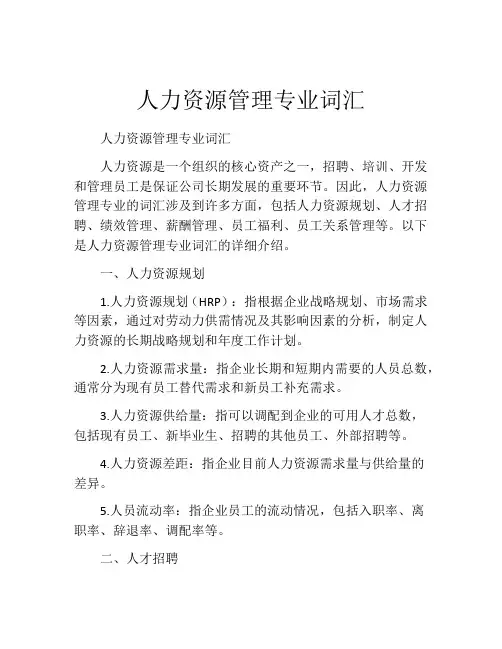
人力资源管理专业词汇人力资源管理专业词汇人力资源是一个组织的核心资产之一,招聘、培训、开发和管理员工是保证公司长期发展的重要环节。
因此,人力资源管理专业的词汇涉及到许多方面,包括人力资源规划、人才招聘、绩效管理、薪酬管理、员工福利、员工关系管理等。
以下是人力资源管理专业词汇的详细介绍。
一、人力资源规划1.人力资源规划(HRP):指根据企业战略规划、市场需求等因素,通过对劳动力供需情况及其影响因素的分析,制定人力资源的长期战略规划和年度工作计划。
2.人力资源需求量:指企业长期和短期内需要的人员总数,通常分为现有员工替代需求和新员工补充需求。
3.人力资源供给量:指可以调配到企业的可用人才总数,包括现有员工、新毕业生、招聘的其他员工、外部招聘等。
4.人力资源差距:指企业目前人力资源需求量与供给量的差异。
5.人员流动率:指企业员工的流动情况,包括入职率、离职率、辞退率、调配率等。
二、人才招聘1.人才招聘(Recruitment):是指为了填补组织中某个职位或填补职位空缺而开展的活动。
2.岗位描述(Job Description):是指明对某个职位持有者的基本要求,包括职位名称、工作职责、薪资、晋升机会、培训需求等。
3.人才储备(Talent Pool):是指企业长期招聘、培养的人才库,包括候选人名单、简历、面试记录等。
4.人才评估(Assessment):是指为了确定某个候选者是否符合职位要求,开展的面试、测试、背景调查等活动。
5.薪酬谈判(Compensation Negotiation):指企业与候选人之间的薪酬协商,包括薪资、福利、补贴、奖金等。
三、绩效管理1.绩效管理(Performance Management):是指为了明确员工目标、激励员工积极性和提高员工绩效而开展的一系列管理活动。
2.工作目标(Job Objectives):是指针对特定职位或项目,在一定时间范围内需要完成的任务和达成的结果。
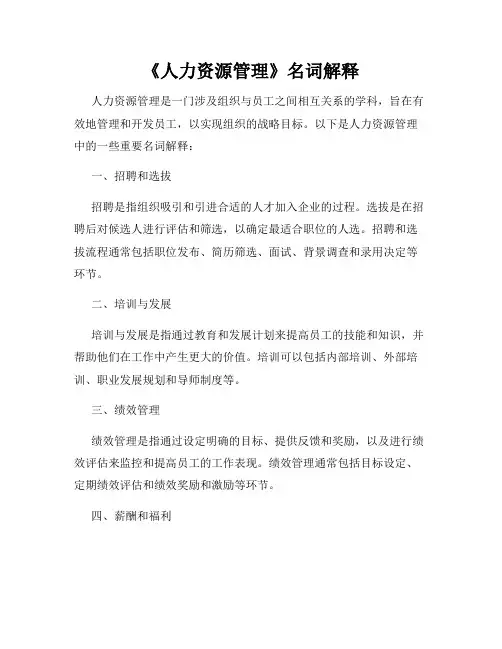
《人力资源管理》名词解释人力资源管理是一门涉及组织与员工之间相互关系的学科,旨在有效地管理和开发员工,以实现组织的战略目标。
以下是人力资源管理中的一些重要名词解释:一、招聘和选拔招聘是指组织吸引和引进合适的人才加入企业的过程。
选拔是在招聘后对候选人进行评估和筛选,以确定最适合职位的人选。
招聘和选拔流程通常包括职位发布、简历筛选、面试、背景调查和录用决定等环节。
二、培训与发展培训与发展是指通过教育和发展计划来提高员工的技能和知识,并帮助他们在工作中产生更大的价值。
培训可以包括内部培训、外部培训、职业发展规划和导师制度等。
三、绩效管理绩效管理是指通过设定明确的目标、提供反馈和奖励,以及进行绩效评估来监控和提高员工的工作表现。
绩效管理通常包括目标设定、定期绩效评估和绩效奖励和激励等环节。
四、薪酬和福利薪酬和福利是组织向员工提供的报酬和福利制度。
薪酬包括基本工资、奖金、津贴等,福利可以包括健康保险、退休金、员工福利等。
薪酬和福利制度旨在吸引、激励和留住优秀的员工。
五、劳动关系劳动关系是指雇主和雇员之间的关系,包括劳动合同、工会关系、劳资协商和劳动法律等。
人力资源管理负责维护良好的劳动关系,确保企业与员工之间的合理权益和互利关系。
六、员工参与员工参与是指员工参与组织决策和问题解决过程。
它可以通过员工反馈、意见调查、团队合作和员工代表等方式实现。
员工参与可以增强员工的归属感和主动性,提高组织的绩效和员工满意度。
七、人才管理人才管理是指在人力资源管理中发现、吸引、培养和留住组织所需的高绩效员工。
人才管理包括人才招聘、人才培养、人才评估和人才维护等方面,旨在保持组织优势和竞争力。
八、多元化与包容性多元化与包容性是指组织在聘用、培训和晋升过程中考虑并重视员工的多样性和不同背景。
多元化与包容性能够提高组织的创新能力,增强员工的归属感和企业形象。
结语人力资源管理涵盖众多名词,这些名词在组织中扮演着不可或缺的角色。
通过正确理解和应用这些名词,组织可以更好地管理和发展自身的人力资源,提高企业的竞争力和可持续发展能力。
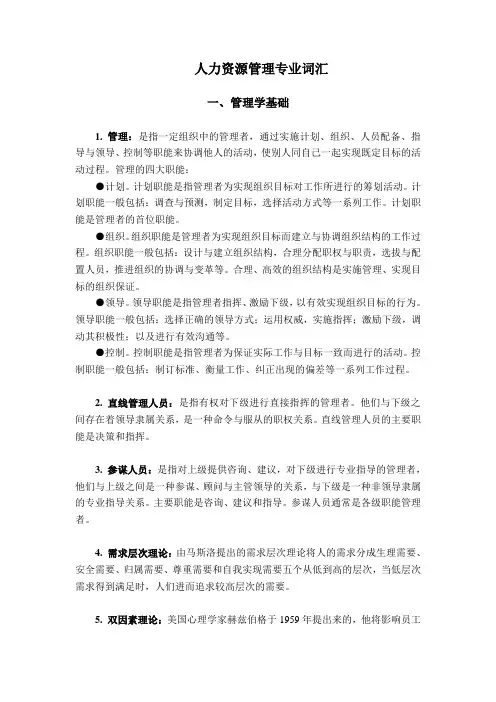
人力资源管理专业词汇一、管理学基础1. 管理:是指一定组织中的管理者,通过实施计划、组织、人员配备、指导与领导、控制等职能来协调他人的活动,使别人同自己一起实现既定目标的活动过程。
管理的四大职能:●计划。
计划职能是指管理者为实现组织目标对工作所进行的筹划活动。
计划职能一般包括:调查与预测,制定目标,选择活动方式等一系列工作。
计划职能是管理者的首位职能。
●组织。
组织职能是管理者为实现组织目标而建立与协调组织结构的工作过程。
组织职能一般包括:设计与建立组织结构,合理分配职权与职责,选拔与配置人员,推进组织的协调与变革等。
合理、高效的组织结构是实施管理、实现目标的组织保证。
●领导。
领导职能是指管理者指挥、激励下级,以有效实现组织目标的行为。
领导职能一般包括:选择正确的领导方式;运用权威,实施指挥;激励下级,调动其积极性;以及进行有效沟通等。
●控制。
控制职能是指管理者为保证实际工作与目标一致而进行的活动。
控制职能一般包括:制订标准、衡量工作、纠正出现的偏差等一系列工作过程。
2. 直线管理人员:是指有权对下级进行直接指挥的管理者。
他们与下级之间存在着领导隶属关系,是一种命令与服从的职权关系。
直线管理人员的主要职能是决策和指挥。
3. 参谋人员:是指对上级提供咨询、建议,对下级进行专业指导的管理者,他们与上级之间是一种参谋、顾问与主管领导的关系,与下级是一种非领导隶属的专业指导关系。
主要职能是咨询、建议和指导。
参谋人员通常是各级职能管理者。
4. 需求层次理论:由马斯洛提出的需求层次理论将人的需求分成生理需要、安全需要、归属需要、尊重需要和自我实现需要五个从低到高的层次,当低层次需求得到满足时,人们进而追求较高层次的需要。
5. 双因素理论:美国心理学家赫兹伯格于1959年提出来的,他将影响员工工作积极性的因素分为两类,即激励因素和保健因素,这两种因素彼此独立,且以不同的方式影响人们的工作行为。
激励因素:所谓激励因素,就是那些使职工感到满意的因素,惟有它们的改善才能让职工感到满意,给职工以较高的激励,调动积极性,提高劳动生产效率。

经济师考试人力资源学习笔记精编第一部分组织行为学第一章组织激励1.需要:因缺乏或期待而产生的心理状态,包括物质需要和社会需要。
2.动机:从事某种活动的更里。
分为内源性动机(内在动机,意愿来自有价值的工作本豆)和外源性动机(外在动机嬴工作带来的报偿)。
3.激励:通过满足员工的需要而使其努力工作,从而实现(组织)目标的过程。
(1)从激励内容的角度:物质激励、精神激励一(2)从激励作用的角度:正向激励、负向激励(3)从激励对象的角度:他人激励、自我激励4.需要层次靠"人均有五种需要,按照从低到高的顺序分别为:生理需要、安全需要、归属和爱的需要、尊重的需式自我实现的需要。
前三个层级为基本藕三要靠而因素;后两个层级为高旋至,主要靠内在因素。
5.双因素理论:满意的对立面是“没有满意”。
决定满意的因素称为激励因素不满意的对立面是“没有不满意”。
决定不满意的因素称为保健因素。
6.ERG理论:人有三种核心需要:生存(E)、相互关系(R)、⅜⅜(G)o“挫折一退化”,如果较高层次的需要不能满足时,对满足低层次需要的欲望就会加强。
7.三重需要理论(麦克利兰):成就需要、权利需要和亲和需要◊成就需要高的人特人a∙选择适度的风险。
b.有较强的责任感。
c.喜欢能够得到及时的反馈。
一◊成就需要的高低与工作绩效密切相关滴成就绩效者在创造活动中更容易获得成功。
◊高成就需要者不一定能成为优秀的经理,因为其只关心自己的业绩而不是影响他人。
权力的需要:有促使别人顺从自己意志的欲望。
喜欢对人发号施令,十分重视争取地位和影响力。
喜欢竞争,追求出色的业绩。
亲和需要:彳至别人建立友善且亲近的人际关系的欲望。
8.公平理论(亚当斯):将自己的产出与投入的比率与他人比。
纵向比较和横向比较、组织内部比较和组织外部比较。
◊薪资水准、教育水平较高的员工,视野较为开阔,依据的信息比较全面,常常以他人为比较对象,进行横向对比;而薪资比较低、教育水平较低的员工则常常作自我的纵向比较。
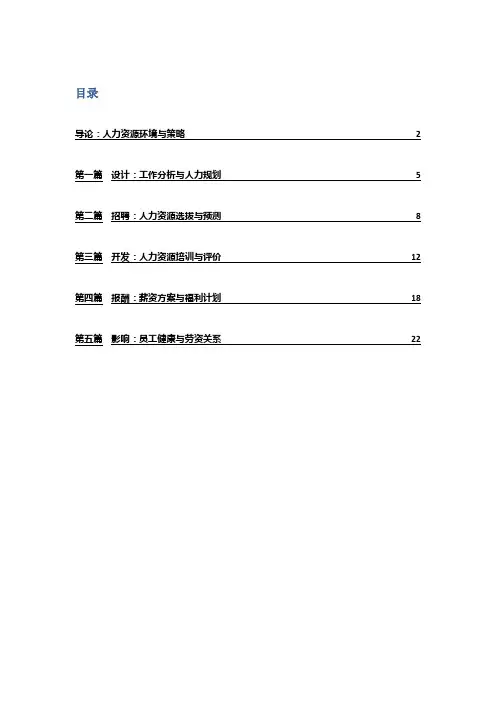
目录导论:人力资源环境与策略2第一篇设计:工作分析与人力规划5第二篇招聘:人力资源选拔与预测8第三篇开发:人力资源培训与评价12第四篇报酬:薪资方案与福利计划18第五篇影响:员工健康与劳资关系22导论:人力资源环境与策略第一章人力资源策略1.人力资源政策与哲学。
人力资源管理(human resource management ,HRM) 。
人力资源管理目标objectives of HRM。
人力资源管理职责duties of HRM。
人力资源管理任务tasks of HRM。
战略性人力资源管理strategic HRM。
人力资源政策human resource policy。
人力资源哲学human resource philosophy。
精神契约psychological contract。
企业认同感organization commitment2.组织:行为与文化。
正式组织formal organization。
非正式组织informal organization。
组织文化organization culture。
亚文化subculture。
跨文化cross-national culture。
价值观values。
态度attitudes。
角色行为role behavior。
个人主义—集体主义individualism-collectivism。
不确定性规避uncertainty avoidance。
权力距离power distance。
直线和职能职权line and staff authority3.激励与组织绩效。
激励motivation。
需要层次理论hierarchy of needs theory。
X理论与Y理论theory X & theory Y。
组织体系Ⅰ与组织体系Ⅳsystem Ⅰ& system Ⅳ。
激励-保健理论motivation-hygiene theory。
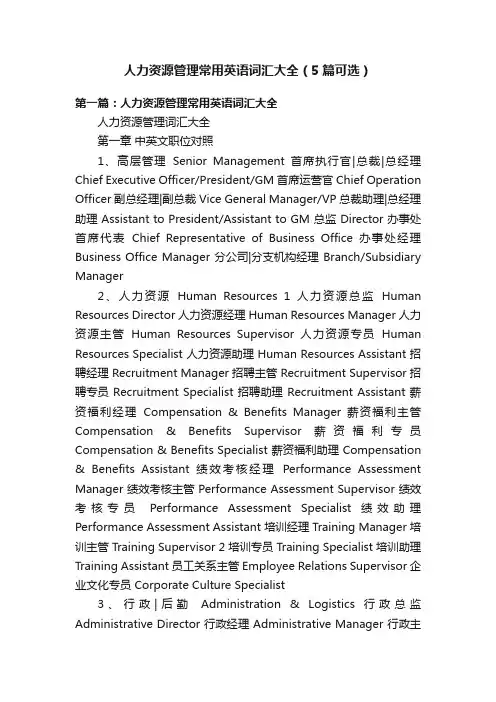
人力资源管理常用英语词汇大全(5篇可选)第一篇:人力资源管理常用英语词汇大全人力资源管理词汇大全第一章中英文职位对照1、高层管理Senior Management 首席执行官|总裁|总经理Chief Executive Officer/President/GM 首席运营官 Chief Operation Officer 副总经理|副总裁 Vice General Manager/VP 总裁助理|总经理助理 Assistant to President/Assistant to GM 总监 Director 办事处首席代表Chief Representative of Business Office 办事处经理Business Office Manager 分公司|分支机构经理 Branch/Subsidiary Manager2、人力资源Human Resources 1 人力资源总监Human Resources Director 人力资源经理 Human Resources Manager 人力资源主管Human Resources Supervisor 人力资源专员Human Resources Specialist 人力资源助理 Human Resources Assistant 招聘经理 Recruitment Manager 招聘主管 Recruitment Supervisor 招聘专员 Recruitment Specialist 招聘助理 Recruitment Assistant 薪资福利经理Compensation & Benefits Manager 薪资福利主管Compensation & Benefits Supervisor 薪资福利专员Compensation & Benefits Specialist 薪资福利助理 Compensation & Benefits Assistant 绩效考核经理Performance Assessment Manager 绩效考核主管 Performance Assessment Supervisor 绩效考核专员Performance Assessment Specialist 绩效助理Performance Assessment Assistant 培训经理 Training Manager 培训主管 Training Supervisor 2 培训专员 Training Specialist 培训助理Training Assistant 员工关系主管 Employee Relations Supervisor 企业文化专员 Corporate Culture Specialist3、行政|后勤Administration & Logistics 行政总监Administrative Director 行政经理 Administrative Manager 行政主管 Administrative Supervisor 办公室主任 Office Administrator 总经办主任GM office Administrator 行政专员|助理Administrative Specialist/Assistant 经理助理|秘书Assistant/Secretary to Manager 前台接待|总机|接待生 Receptionist/Operator/Desk Clerk 后勤 Logistics 保安队长 Security Guard Team Leader 保安 Security Guard 司机Driver 档案资料管理员File Clerk 3 电脑操作员|打字员Computer Operator/Typist 清洁工 Cleaner 办公文员 Officer 部门专员|助理 Department Specialist/Assistant4、信息技术Information Technology 首席技术执行官Chief Technology Officer 首席信息官 Chief Information Officer 技术总监Technical Director 技术经理 Technical Manager 技术主管 Technical Supervisor 高级硬件工程师 Senior Hardware Engineer 硬件工程师Hardware Engineer 高级软件工程师 Senior Software Engineer 软件工程师Software Engineer ERP技术开发ERP Technology Development Staff ERP应用支持工程师 ERP Application Support Engineer ERP实施工程师/顾问ERP Implementation Engineer/Consultant 4 系统集成工程师System Integration Engineer 系统分析员 System Analyst 系统工程师 System Engineer 数据库工程师|管理员 Database Engineer/Administrator 计算机辅助设计工程师Computer Aided Design Engineer 信息技术经理IT Manager 信息技术主管 IT Supervisor 信息技术专员 IT Specialist 项目总监 Project Director 项目经理 Project Manager 项目主管 Project Supervisor 项目执行|协调人员 Project Specialist/Coordinator 技术支持经理Technical Support Manager 技术支持主管Technical Surport Supervisor 技术支持工程师 Technical Support Engineer 计量工程师Measure Engineer 标准化工程师Standardization Engineer 品质经理 Quality Manager 5 品质主管 Quality Supervisor 品质工程师 Quality Engineer 系统测试 System Testing软件测试工程师Software Testing Engineer 硬件测试工程师Hardware Testing Engineer 测试员 T est Engineer /Tester 技术文员|助理Technical Clerk/Assistant 系统管理员|网络管理员System Administrator/Network Administrator 程序员Programmer UI设计师 UI Developer/UI Designer UI设计顾问 UI Design Consultant 需求工程师 Demand engineer 系统架构设计师 System Architect 仿真应用工程师 CAE Engineer(Computer Aided Engineering)嵌入式硬件开发 Embedded hardware Development5、咨询 Consulting 6 咨询总监 Consulting Director 咨询经理Consulting Manager 专业培训师Professional Trainer 咨询顾问Consultant 市场情报/信息分析员 Market Intelligence Analyst 咨询项目经理 Consult Project Manager 咨询项目协调员 Consult Project Coordinator6、建筑结构|装潢Construction/Decoration 首席/总建筑师Chief Architect 建筑设计经理Construction Manager 建筑设计师Architect(偏设计)建筑制图师CAD Drafter 建筑工程师Construction Engineer(偏建造)建筑结构工程师Construction Structural Engineer 土木|土建工程师 Civil Engineer 给排水|暖通工程师Drainage/HVAC Project Engineer 城市规划与设计师City Designer/Planner 7Architectural 室内外装潢设计师Interior and Exterior Decoration Designer 装潢工Decorator 园艺|园林|景观设计师Gardening Designer 电气工程师Electrical Engineer 测绘|测量师Mapping/Surveyor 工程造价经理 Project Estimation Manager 工程造价工程师 Project Estimator 建造估算师 Construction Estimator 工程预决算工程师 Project Budgeting Engineer 预算分析师 Budget Analyst 建筑工程经理 Construction Project Manager 建筑工程验收Construction Project Inspector 工程监理人Construction Supervisor 施工员 Construction Staff 智能大厦|综合布线 Intelligent Building/Integrated Wiring 工程总监Project Director 工程经理Project Manager 8 工程主管 Project Supervisor 招商经理 Business Manager 招商专员 Business Specialist 合约经理 Contract Manager合同管理工程师Contract Engineer 房地产项目配套工程师Conveyance System Engineer 招标人Tenderee 投标人Bidder/Tenderer 投标/招标工程师T enders Engineer 工程审计经理Project Auditing Manager 工程审计主管Project Auditing Supervisor 工程审计专员Project Auditing Specialist 安装工程师Installation Engineer 装潢工程师 Decoration Engineer 报批报建经理 Construction Applying manager 报批报建工程师 Construction Applying Engineer 水电工程师 Water and electricity engineer 弱电工程师 Milliampere Engineer 勘测工程师 Exploration Engineer 9 设计协调员 Design Coordinator 工程文员|助理 Engineering clerk 幕墙工程师Curtain Wall Engineer 涂料研发工程师Coating Development Engineer 岩土工程师 Geotechnical Engineer7、酒店|餐饮|娱乐 Hotel/Restaurant & Food / Entertainment餐饮|娱乐管理Restaurant & Food / Entertainment Services Management 餐饮|娱乐领班 Restaurant & Food / Entertainment Services Supervisor 服务员 Waiter 礼仪|迎宾 Receptionist 行政主厨|厨师长 Executive Chef 厨师 Chef 切配 Kitchen Operator 美容化妆顾问 Beauty/Makeup Advisor 化妆师|造型师 Make-up Artist 10 宾馆|酒店经理 Hotel Manager 宾馆|酒店营销 Hotel Marketing Staff 大堂经理Hall Manager 楼面经理Floor Manager 前厅接待Receptionist 客房服务员|楼面服务员Room/Floor Service Attendant 行李员 Bellperson 清洁服务人员 Housekeeping Staff8、财务|审计|税务Finance/Auditing/Tax 首席财务官Chief Finance Officer 总经济师Chief Economist 总会计师Chief Accountant 财务总监 Finance Director 财务经理 Finance Manager 财务顾问 Finance Advisor 财务主管 Finance Supervisor 财务|会计助理Finance/Accounting Assistant 总帐主管General Ledger Supervisor 11 会计经理Accounting Manager 会计主管Accounting Supervisor 会计 Accountant 出纳员 Cashier 财务分析经理Financial Analysis Manager 财务分析主管Finance AnalysisSupervisor 财务分析员 Finance Analyst 成本经理 Cost Accounting Manager 成本主管Cost Accounting Supervisor 成本会计Cost Accounting Specialist 资金经理Treasury Manager 资金主管Treasury Supervisor 资金专员Treasury Specialist 审计总监Auditing Director 审计经理 Auditing Manager 审计主管 Auditing Supervisor 审计专员Auditing Specialist 审计助理Auditing Assistant 税务经理 Tax Manager 12 税务主管 Tax Supervisor 税务专员 Tax Specialist 税务助理 Tax Assistant 统计员 Statistician 投资总监 Investment Director 投资经理 Investment Manager 投资主管Investment Supervisor 投资专员Investment Specialist 应收会计Account Receivable Accountant 应付会计Account Payable Accountant9、客服及技术支持 Customer Service & Technical Support 客服总监Customer Service Director 客服经理(非技术)Customer Service Manager(Non-Technical)客服主管(非技术)Customer Service Supervisor(Non-T echnical)客服专员|助理(非技术)Customer Service 13 Specialist/Assistant(Non-Technical)售前|售后技术支持经理 Technical Support Manager 售前|售后技术支持主管Technical Support Supervisor 售前|售后技术支持工程师Technical Support Engineer 现场应用工程师 Field Application Engineer 呼叫中心客服代表 Call Center Customer Service Representative10、翻译Translator 英语翻译English Translator 日语翻译Japanese Translator 德语翻译 German Translator 法语翻译 French Translator 俄语翻译 Russian Translator 韩语翻译 Korean Translator11、互联网开发|应用Internet Development and Application 互联网软件开发工程师Internet Software Engineer 14 多媒体|游戏开发工程师 Multimedia/Game Development Engineer 网站营运经理Web Operations Manager 网站营运主管Web Operations Supervisor 网站营运专员Web Operations Specialist 网络工程师Web Engineer 网站策划Website Designer 网站编辑WebsiteEditor 网页设计|制作 Web Designer/Production 网络信息安全工程师Information Security Engineer 网络架构设计师Network Architect Designer 网站维护工程师Website Maintenance Engineer12、销售Sales 销售总监Sales Director 销售经理Sales Manager 销售主管Sales Supervisor 渠道|分销经理Channel/Distribution Manager 渠道|分销主管Channel/Distribution Supervisor 15 客户经理Sales Account Manager 客户主管Sales Account Supervisor 大区销售总监Regional Sales Director 大区销售经理 Area Sales Manager 区域销售经理 Regional Sales Manager 销售代表 Sales Representative 渠道|分销专员Channel/Distribution Specialist 客户代表Sales Account Representative 销售工程师Sales Engineer 电话销售代表Telesales Representative 电话销售审计专员Telesales Audit Specialist 销售行政经理 Sales Administrative Manager 销售行政主管Sales Administrative Supervisor 销售行政专员|助理Sales Administrative Specialist/Assistant 商务经理 Business Manager 商务主管 Business Supervisor 商务专员 Business Specialist 商务助理Business Assistant 16 销售助理Sales Assistant 汽车销售|经纪人AutomobileSales Representative|Brokers 4S店经理 4S Shop Manager 业务分析专员|助理Business Specialist/Assistant 选址拓展|新店开发Location Development 渠道|分销总监Channel/Distribution Director13、公关|媒介Public Relations/Media 公关经理Public Relations Manager 公关主管 Public Relations Supervisor 公关专员Public Relations Specialist 会务经理Event Manager 会务主管Event Supervisor 会务专员Event Specialist 媒介经理Media Manager 媒介主管 Media Supervisor 媒介专员 Media Specialist 17 Analysis 公关|媒介助理 Public Relations/Media Assistant14、生物|医疗Biotechnology/Medical 生物工程师Bioengineer 制药工程师Pharmaceutical Engineer 化工技术应用Chemical Technical Application 化学分析员 Chemical Analyst 医药技术研发管理人员 Pharmaceutical Technology R&D Management Staff 医药技术研发人员Pharmaceutical Technology R&D Specialist 临床研究员Clinical Researcher 临床研究协调员Clinical Research Coordinator 药品注册Pharmaceuticals Register Specialist 药品生产|质量管理 Manufacturing/Quality Management 药品市场推广经理 Pharmaceutical Marketing Manager 药品市场推广Pharmaceutical Marketing Staff 医疗器械市场推广Medical Equipment Marketing Staff 18Pharmaceutical 医疗器械销售 Medical Equipment Sales Staff 医药销售经理Pharmaceutical Sales Manager 医药销售主管Pharmaceutical Sales Supervisor 医药销售代表Pharmaceutical Sales Representative OTC销售经理Over the Counter Sales Manager OTC销售主管OTC Sales Supervisor OTC销售代表OTC Sales Representative 化工实验室研究员|技术员Chemical Laboratory Researcher|Technician 药库主任|药剂师Pharmaceutical Warehouse Director|Pharmacist医药学检验Medical Examination 医疗设备注册Medical Devices Registration15、广告|设计Advertising/Designing 艺术|设计总监Artistic/Design Director 广告客户总监Advertising Account Director 广告客户经理 Advertising Account Manager 广告客户主管Advertising Account Supervisor 19 广告创意总监Creative Advertising Director 广告创意|设计经理Creative Advertising /Design Manager 广告创意|设计师Creative Advertising /Design Specialist 文案Copywriter 企业策划经理Business Planning Manager 企业策划主管 Business Planning Supervisor 企业策划人员 Business Planning Staff平面设计 Graphic Artist/Designer 动画|3D设计Animation/3D Designer 陈列设计|展览设计Display/Exhibition Designer 多媒体设计Multimedia Designer 包装设计Package Designer 工业|产品设计Industrial/Product Designer 工艺品|珠宝设计 Artwork/Jewelry Designer家具|家居用品设计 Furniture/Household Product Designer 玩具设计 Toy Designer平面设计经理 Graphic Design Manager 20 语音|视频开发工程师Digital Audio/Video Engineer 版图设计工程师Layout Design Engineer平面设计总监 Graphic Design Director16、律师|法务Lawyer/In-house Counsel 律师|法律顾问Lawyer/Legal Counsel 律师助理 Lawyer Assistant 法务经理 Legal Manager 法务主管 Legal Supervisor 法务Legal Specialist 法务助理Legal Assistant 知识产权|专利顾问Intellectual Property/Patent Consultant 知识产权|专利专员IP/Patent Specialist17、采购Purchasing 采购总监Purchasing Director 采购总监(国外)Purchasing Director(overseas)采购经理Purchasing Manager 21 采购经理(国外)Purchasing Manager(overseas)采购主管Purchasing Supervisor 采购主管(国外)Purchasing Supervisor(overseas)采购员 Purchasing Specialist 采购员(国外)Purchasing Specialist(overseas)采购助理 Purchasing Assistant18、物流|运输Logistics/Distribution 物流总监Logistics Director 物流经理Logistics Manager 物流主管Logistics Supervisor 物流专员|助理Logistics Specialist/Assistant 订单管理Order management 供应链总监 Supply Chain Director 供应链经理Supply Chain Manager 供应链主管 Supply Chain Supervisor 供应链专员 Supply Chain Specialist 物料经理 Materials Manager 物料主管 Materials Supervisor 22 物料专员 Materials Specialist 仓库经理 Warehouse Manager 仓库主管 Warehouse Supervisor 仓库管理员 Warehouse Specialist 运输经理 Transportation Manager 运输主管Transportation Supervisor 海|空运操作Sea & AirTransportation Staff 船务人员Shipping Specialist 集装箱业务员Container Business Specialist 快递员 Courier 调度员 Dispatcher 理货员 Warehouse Stock Management Staff19、质量|安全管理Quality/Security Management 质量总监Quality Director 质量管理经理QA Manager 质量管理主管QA Supervisor 质量管理工程师|员QA Engineer/Inspector 测试经理Test Manager 23 测试主管Test Supervisor 测试工程师|员Test Engineer/Tester 检验员Quality Control Inspector 可靠度工程师Reliability Engineer 失效分析工程师 Failure Analysis Engineer 认证工程师|审核员Certification Engineer/Auditor 体系工程师|审核员Systems Engineer/Auditor 安全|健康|环境经理Safety/Health/Environmental Manager 安全|健康|环境主管Safety/Health/Environmental Supervisor 安全|健康|环境工程师Safety/Health/Environmental Engineer 食品检验Food Inspector 品控经理QC Manager 品控主管QC Supervisor 品控工程师QC Engineer 来料品控IQC(Incoming Quality Control)制程品控IPQC(Input Process Quality Control)24 过程品控 PQC(Process Quality Control)终检 FQC(Final Quality Control)出货品控 OQC (Outgoing Quality Control)质量管理|验货员Quality Management Staff/Inspector 材料|设备质量管理Material|Facility Quality Management 医疗设备生产|质量管理Medical Equipment Manufacture|Quality Management 防损员Loss Prevention Specialist20、服装|纺织|皮革 Clothes/Textile/Leather 服装|纺织设计总监Clothes/Textile Design Director 服装|纺织设计Clothes/Textile Designer 服装|纺织|皮革跟单Clothes/Textile/Leather Merchandiser 打版师/制模工:Patterner/Pattern Maker 样板设计师 Pattern Designer 服装打样|制版 Apparels Sample Production 配色技术员Color Matching Techncian 25 裁剪车缝熨烫Tailoring, Sewing and Ironing21、媒体 Media 总编|副总编 Chief/Vice Chief Editor 发行总监Publishment Director 编辑 Editor 记者 Journalist / Reporter 美工/美术编辑Art Editor 排版设计Layout Designer 校对|录入Proofreader/Data Entry Staff 出版|发行Publishing/Distribution Staff 印刷机械机长 Printing Machine Operator 印刷工 Printer 印刷排版|制版 Layout Designer 数码直印|菲林输出 Digital/Film Printing 调墨技师 Ink Technician 美术指导 Art Instructor22、房地产 Real Estate 26 房地产项目经理 Real Estate Project Manager 房地产项目工程师 Real Estate Project Engineer 房地产开发|策划经理 Development/Planning Manager 房地产开发|策划主管Development/Planning Supervisor 房地产开发|策划Real Estate Development/Planning Staff 房地产评估师 Real Estate Appraiser 房地产中介|经纪人Real Estate Agent/Broker 房地产销售经理Real Estate Sales Manager 房地产销售主管 Real Estate Sales Supervisor 房地产销售 Real Estate Sales Staff 房地产销售助理 Real Estate Sales Assistant23、物业管理Property/Realty Management 物业顾问Property/Realty Consultant 物业管理经理Property/Realty Management Manager 物业管理主管Property/Realty Management Supervisor 27RealEstateRealEstate 物业管理专员|助理Property/Realty Management Specialist/Assistant 物业招商|租赁|租售Property/Realty Investment Promotion/Lease/Rent Staff 物业设施管理人员 Realty Facilities Management Staff 物业维修人员Realty Maintenance Staff24、电子|电器|半导体|仪器仪表 Electronics/ElectricalAppliance/Semiconductor/Instruments and Meters 集成电路设计Integrated Circuit Design 集成电路应用工程师Integrated Circuit Application Engineer 集成电路验证工程师Integrated Circuit Verification Engineer 电子工程师|技术员Electronic Engineer/Technician 电气工程师|技术员Electrical Engineer/Technician 电路工程师|技术员Circuit Engineer/Technician 电声|音响工程师|技术员Electroacoustic/Acoustic 28 Engineer/Technician 半导体技术Semiconductor Technology 自动控制工程师|技术员Automatic Control Engineer/Technician 电子软件开发Electronic Software Development 嵌入式软件开发 Embedded Software Development 电池|电源开发Battery/Power Development 现场应用工程师Field Application Engineer 家用电器|数码产品研发 Household Electrical Appliance/Digital Products R&D 仪器|仪表|计量Instruments/Meters/Measurers 测试工程师 Testing Engineer 射频工程师 Radio Frequency Engineer25、工程|机械Engineering/Mechanical 技术研发总监Technical Design Direcor 技术研发经理 Technical Design Manager 技术研发主管Technical Design Supervisor 技术研发工程师Technical Design Engineer 29 工程经理 Project Manager 工程主管Project Supervisor 产品工艺|制程工程师 Process Engineer 产品规划工程师Product Planning Engineer 实验室负责人|工程师Lab Manager/Engineer 工程|设备经理Engineering/Facility Manager 工程|设备主管Engineering/Facility Supervisor 工程|设备工程师Engineering/Facility Engineer 工程|机械绘图员 Project/Mechanical Drafting Specialist 工业工程师Industrial Engineer 机械工程师Mechanical Engineer 装配主管Assembling Engineer 模具主管Fooling Supervisor 模具工程师Tooling Engineer 维修主管Maintenance Supervisor 机电工程师Electrical & Mechanical Engineer 维修工程师Maintenance Engineer 铸造|锻造工程师Casting/Forging Engineer 注塑成型主管Injection MoldingSupervisor 30 注塑工程师 Injection Engineer 焊接工程师 Welding Engineer 夹具工程师 Clamp Engineer/Fixture Engineer 数控机床工程师CNC Engineer 结构工程师Structural Engineer 冲压工程师Punching Engineer/Stamping Engineer 锅炉工程师Boiler Engineer 电力工程师Electric Power Engineer 光源与照明工程Lighting Engineer 汽车|摩托车工程师Automotive/Motorcycle Engineer 船舶工程师Shipping Engineer 科研人员Research Specialist 科研管理人员 Research Management Staff 电子|电器维修工程师 Electrical Maintenance Engineer 公路|桥梁|港口|隧道工程师Road|Bridge|Harbor|Tunnel Project Engineer 汽车设计工程师Automobile Design Engineer 汽车装配工艺工程师Automobile Assembly Engineer 汽车电子工程师Automotive Electronics Engineer 31 汽车结构工程师 Automotive Structural Engineer26、市场|营销 Marketing 市场|营销总监 Marketing Director 市场|营销经理Marketing Manager 市场|营销主管Marketing Supervisor 市场|营销专员 Marketing Specialist 市场助理 Marketing Assistant 市场分析|调研人员 Marketing Analyst/Research Analyst 运营经理 Operation Manager 运营主管 Operation Supervisor 品牌经理 Brand Manager 品牌主管 Brand Supervisor 品牌专员 Brand Specialist 市场通路经理Trade Marketing Manager 市场通路主管Trade Marketing Supervisor 市场通路专员Trade Marketing Specialist 市场企划经理 Marketing Planning Manager 市场企划主管Marketing Planning Supervisor 32 市场企划专员Marketing Planning Specialist 促销经理Promotions Manager 促销主管Promotions Supervisor 促销督导 Promotions Superintendent 促销员|导购Promotions Specialist 业务发展经理Business Development Manager 业务发展主管Business Development Supervisor 业务发展专员 Business Development Specialist 业务分析经理 Business Analysis Manager 培训师 Trainer 供应商管理经理Supplier management Manager 供应商管理主管Suppliermanagement Supervisor 供应商管理专员Supplier management Enginior 社会责任主管 Social responsibility Supervisor 渠道管理专员Channel management Specialist 媒介采购总监Media Purchasing Director 媒介采购经理 Media Purchasing Manager 媒介采购专员 Media Purchasing Specialist 3327、通信技术Communication Technology 通信技术工程师Communications Engineer 有线传输工程师Wired Transmission Engineer 无线通信工程师 Wireless Communication Engineer 电信交换工程师Telecommunication Exchange Engineer 数据通信工程师Data Communication Engineer 移动通信工程师Mobile Communications Engineer 电信网络工程师Telecommunication Network Engineer 通信电源工程师Communication Power Engineer28、批发|零售 Wholesales/Retails 店长 Shop Manager 卖场经理 Store Manager 店员|营业员 Shop Assistant/Salesperson 收银员Cashier 营运督导Operation Supervisor 理货员|陈列员Tally Clerk/Display Staff 导购员Purchasing Guider 寻呼员|话务员Paging Operator 3429、金融Finance 分行行长Branch President 支行行长Sub-branch President 资产评估|分析员Assets Appraiser/Analyst 风险控制 Risk Control 信贷管理员 Loan Management Staff 信用调查|分析人员 Credit Investigator/Analyst 信用控制员 Credit Controllor 进出口|信用证结算Import & export/L/C Settlement 外汇交易Foreign Exchange Dealer 清算人员 Liquidation Staff 高级客户经理|客户经理 Senior Customer Manager/Customer Manager 客户主管Customer Supervisor 客户专员 Customer Specialist 银行柜员 Bank Teller 银行卡、电子银行业务推广Bank Cards and E-banking Business Marketing 35 证券|期货|外汇经纪人Securities(Stock)/Futures/Foreign Exchange Broker 证券分析师 Securities Analyst 股票|期货操盘手Stock/Futures Operators 金融|经济研究员Financial and Economic Researcher 投资|基金项目经理Investment/Fund Project Manager 投资|理财顾问Investment/Financing Consultant 投资银行业务Investment Banking Business 基金分析师Fund Analyst 融资经理Financing Manager 融资主管Financing Supervisor 融资专员Financing Specialist 保险精算师Actuary 保险业务经理Insurance Business Manager 保险业务主管 Insurance Business Supervisor 保险代理|经纪人Insurance Agent/Broker 理财顾问|财务规划师Financial Consultant/Finance Planner 保险核保 Insurance Underwriter 36 保险理赔Insurance Settlement Staff 保险客户服务Insurance Customer Service 保险内勤Insurance Office Staff 保险产品开发Insurance Product developer30、贸易Trading 贸易经理Trade Manager 贸易主管Trade Supervisor 贸易专员|助理Trade Specialist/Assistant 外贸经理Overseas Trade Manager 外贸主管 Overseas Trade Supervisor 外贸专员|助理Overseas Trade Specialist/Assistant 进出口经理Import/Export Manager 进出口主管 Import/Export Supervisor 进出口专员Import/Export Specialist 业务跟单经理Merchandising Manager 高级业务跟单Senior Merchandiser 业务跟单Merchandiser 助理业务跟单 Assistant to Merchandiser 37 货运代理 Shipping Agent 报关主管 Customs Supervisor 报关员 Customs Specialist 单证员 Documentation Specialist31、操作工 Technician 钳工|机修工 Locksmith/Mechanic 钣金工:Metaler 电焊工|铆焊工 Electric Welding Worker 车工|磨工|铣工|冲压工|锣工Latheman/Grinder/Miller/Puncher/Turner 模具工Mould Worker 电工 Electrician 叉车工 Forklift Worker 空调工 Air-Condition Worker 电梯工 Lift Worker 锅炉工 Steam Worker/Boiler 水工|木工|油漆工 Plumber/Carpenter/Painter 喷漆工 Spray Painter 38 汽车修理工Automotive Repairer 技工Technician / Engineer Trainee 普工 General Worker 搬运工 Porter 包装工 Packer 装配工Assembler 汽车修理人员 Vehicle Repairs 医疗器械维修人员 Medical Equipment repairer 切割工 Cutter32、生产|营运Production/Operations 工厂经理|厂长Plant/Factory Manager总工程师|副总工程师Chief/Vice Chief Engineer 技术总监Technical Director 技术经理 Technical Manager 技术主管 Technical Supervisor 生产总监Production Director 生产经理Production Manager 生产主管 Production Supervisor 39 生产督导 Production Superintendent 生产领班|线长 Production T eam Leader 制造工程师Manufacturing Engineer 生产文员Production Clark 项目总监Project Director 项目经理Project Manager 项目主管Project Supervisor 项目工程师Project Engineer 营运总监Operations Director 营运经理Operations Manager 营运主管Operations Supervisor 营运专员Operations Specialist 车间主任Workshop Supervisor生产计划经理Production Planning Manager 生产计划主管Production Planning Supervisor 生产计划协调员Production Planning Coordinator 生产计划助理Production Planning Assistant 化验员Laboratory T echnician 产品经理Product Manager 40 产品主管Product Supervisor 产品专员Product Specialist 培训技师 Trainning Technician 成本分析员 Cost Analyist 环保工程师Environmental Engineer 增值产品开发工程师Value-added Product Developer 污水处理工程师Water Solution Engineer第二章 HRM相关词组1、HRM相关英语词组——以模块为顺序(1)、人力资源规划Human Resource Planning 人力资源计划 strategic planning 战略规划 long term trend 长期趋势requirement/demand forecast 需求预测availability/supplyforecast 供给预测management inventory 管理人力储备41 downsizing裁减Human Resource Information System,HRIS 人力资源信息系统Administrative/Management Level 管理层次Administrative Line 直线式管理 Delayering 扁平化Flat Organizational Structure 扁平化组织结构Horizontal Organizational Structure 扁平化组织结构 division structure 事业部结构Line Authority 直线职权Line Manager 直线经理Line Structure 直线结构organization development,OD组织发展 survey feedback 调查反馈 quality circles 质量圈management by objective,MBO 目标管理Total Quality Management,TQM 全面质量管理 team building 团队建设 external environment 外部环境 42 internal environment 内部环境 Policy 政策corporate culture 企业文化 Mission 目标 Shareholders 股东informal organization 非正式组织multinational corporation,MNC 跨国公司managing diversity 管理多样性Core Competence 核心竞争力 Core Value 核心价值观 Core Worker 核心员工Core Workforce 核心工作团队Corporate Culture 企业文化Corporate Identity 企业识别 Corporate Image 企业形象(2)、招聘与配置 Position 职位 Job Vacancy 职缺 43 Post a job 发布招聘信息 job analysis 工作分析job analysis schedule,JAS 工作分析计划表Management Position Description Questionnaire,M PDQ 管理岗位描述问卷Competency Model 胜任特征模型 Competency 胜任特征 Job Code 工作编号,职位编号 Job Context 工作背景Job Description 职位描述,工作说明 Job Design 工作设计 Job Enlargement 工作扩大化 Job Enrichment 工作丰富化Job Qualification and Restriction 工作任职条件和资格Job Redesign 工作再设计 Job Rotation 工作轮换 Job Satisfaction 工作满意度 Job specifications 工作说明书 Job Standard 工作标准 44 Job Stress 工作压力 Job Surrounding 工作环境 Job Specialization 工作专业化 Job structure 工作结构Recruitment and placement招聘与配置Age Composition 年龄结构Age Discrimination 年龄歧视Sexual Discrimination 性别歧视Resume Inventory 简历数据库Resume 简历Employment Application Form 应聘申请表 Recruiter 招聘人员Employment Consultant 招聘顾问 Cost Per Hire 单位招聘成本Recruitment Ditch 招聘渠道Recruitment Examination 招聘考试Recruitment Method 招聘方法 Intern(student)实习生 Internship 实习 45 Internal Recruitment 内部招聘 Internal referral 内部推荐Internal Job Posting 内部职位公开招聘 External Employment 外部招聘 External Labor Supply 外部劳力供应 External Recruiting Sources 外部招聘来源 External Recruitment Environment 外部招聘环境External labor market 外部劳动力市场Labor Dispatching Agency 劳务派遣中介 Labor Dispatch 劳工派遣 Job Posting 公开招聘、工作公告 Campus Recruiting 校园招聘 E-Recruit 网络招聘Recruitment Website 招聘网站 Advertising 广告Employment Agency 职业介绍所Applicant-Initiated Recruitment 自荐式招聘 Application Blank 申请表 Application forms 申请表 46 employee requisition 员工申请表 Employment at will 自由就业 Employment Objective 应聘职位 Selection 选择 Initial Interview 初试Interview Planning List 面试计划表 Interview 面试Interview Content 面试内容selection rate 选择率standardization 标准化 validity 有效性 objectivity 客观性 norm 规范cutoff score 录用分数线 aiming 准确度job knowledge tests 业务知识测试 employment interview 求职面试 unstructured interview 非结构化面试 structured interview 结构化面试 47 group interview 小组面试Occupational /Vocational interest test 职业兴趣测试board interview会议型面试 Situational Interview 情景面试Behavioral Description Interview 行为描述面试Interview Method 访谈法 Written Examination 笔试 Employment 雇用 offer letter 录用通知书Employment Offer/Enrollment 录用 Promotion 晋升Promotion From Within ,PFW 内部提升 Internal Promotion 内部晋升 Demotion 降职 Transfer 调动 Dimission 离职 Resignation 辞职Dismissal 解雇;开除Employee Turnover 员工流动48 Dimission Interview 离职面谈Exit Interview 离职面谈Dimission Rate 离职率Employee Turnover Rate 员工流动率Employment Separation Certificate 离职证明书 Pink Slip 解雇通知Walking Papers解雇通知dismissal reason 解雇理由Severance pay解雇费/遣散费 Release pay解雇费/遣散费 Dismissal pay/wage 解雇费/遣散费 Termination at Will 随意解雇 Termination 解雇;终止 Downsizing精简裁员Unemployment Compensation 失业津贴Unemployment Insurance 失业保险Unemployment Rate 失业率Unemployment 失业49(3)、培训和开发Human Resource Development(HRD)人力资源开发Employee Training Method 员工培训方法Training 培训Development 开发 Orientation 定位 Coaching 训练 Mentoring 辅导 Mentor 辅导员、导师 business games 经营管理策略 case study 案例研究 conference method 会议方法 role playing 角色扮演 jobrotating 工作轮换on boarding training 入职培训Orientation Training 入职培训On-the-job training(OJT)在职培训Apprenticeship Training 学徒式培训 Apprenticeship 学徒制 50第二篇:人力资源管理人力资源管理第一章人力资源管理概论第一节人力资源与人力资源管理一、人力资源:指一定范围内能够为社会创造物质财富和精神财富、具有体力劳动和脑力劳动能力的人口的总和。
人力资源常用词汇英汉对照Acceptability 可接受性Achievement tests 成就测试Action plan 行动计划Action steps 行动步骤Adventure learning 探险学习法Adverse impact 负面影响Agency shop 工会代理制Alternative dispute resolution (ADR) 建设性争议解决方法Analytic approach 分析法Appraisal politics 评价政治学Apprenticeship 学徒制Arbitrary 仲裁Assessment 评价Assessment center 评价中心Attitude awareness and change program 态度认知与改变计划Attitudinal structuring 态度构建Audiovisual instruction 视听教学Audit approach 审计法Balanced scorecard 综合评价卡Basic skills 基本技能Behavior-based program 行为改变计划Behavior modeling 行为模拟Benchmarks 基准Benchmarking 评判Benefits 收益Bonus 奖金Boycott 联合抵制Career 职业Career counseling 职业咨询Career curves (maturity curves) 职业曲线(成熟曲线)Career management system 职业管理系统Career support 职业支持Centralization 集权化Coach 教练Cognitive ability 认知能力Cognitive outcomes 认知性结果Collective bargaining process 劳资谈判过程Community of practice 演练小组Compa-ratio 比较比率Compensable factors 报酬要素Competency assessment 能力评估Competitive advantage 竞争优势Concentration strategy 集中战略Concurrent validation 同时效度Consumer price index, CPI 消费者价格指数Content validation 内容效度Continuous learning 持续学习Contributory plan 投入计划Coordination training 合作培训Core competencies 核心竞争力Criterion-related validity 效标关联效度Critical incident 关键事件Critical incident method 关键事件法Cross-cultural preparation 跨文化准备Cross-training 交叉培训Cultural environment 文化环境Cultural shock 文化冲击Customer appraisal 顾客评估Data flow diagram 数据流程图Database 数据库Decentralization 分散化Decision support systems 决策支持系统Defined-benefit plan 养老金福利计划Defined-contribution plan 资方养老金投入计划Delayering 扁平化Depression 沮丧Development planning system 开发规划系统Differential piece rate 差额计件工资Direct costs 直接成本Discipline 纪律Disparate impact 差别性影响Disparate treatment 差别性对待Diversity training 多元化培训Downsizing 精简Downward move 降级Efficiency wage theory 效率工资理论Electronic performance support system (EPSS) 电子绩效支持系统Employee empowerment 员工授权Employee leasing 员工租借Employee survey research 雇员调查与研究Employee wellness programs (EWPs) 雇员健康修炼计划Entrepreneur 企业家Equal employment opportunity (EEO) 公平就业机会Essay method 书面方式Ethics 道德Expatriate 外派雇员Expert systems 专家系统External analysis 外部分析External growth strategy 外边成长战略External labor market 外部劳动力市场Factor comparison system 因素比较法Feedback 反馈Flexible benefits plans (cafeteria plans) 灵活的福利计划(自助福利方案)Flextime 灵活的时间Forecasting(劳动力供求)预测Formal education programs 正规教育计划Frame of reference 参照系Functional job analysis, FJA 职能工作分析Gain sharing plans 收益分享计划Globalization 全球化Goals 目标Goals and timetables 目标和时间表Graphic rating-scale method 图式评估法Group-building methods 团队建设法Group mentoring program 群体指导计划Hay profile method 海氏剖析法High-leverage training 高层次培训High-performance work systems 高绩效工作系统Hourly work 计时工资制Human capital 人力资本Human resource information system (HRIS) 人力资源信息系统Human resource management 人力资源管理Human resources planning, HRP 人力资源计划Indirect costs 间接成本Individualism/collectivism 个人主义/集体主义Input 投入Instructional design process 指导性设计过程Internal analysis 内部分析Internal growth strategy 内部成长战略Internal labor force 内部劳动力Internet 互联网Internship programs 实习计划Interview 面试Intraorganizational bargaining 组织内谈判Job analysis 工作分析Job classification system 工作分类法Job description 工作描述Jobdesign 工作设计Job enlargement 工作扩大化Job enrichment 工作丰富化Job evaluation 工作评价Job experiences 工作经验Job involvement 工作认同Job posting and bidding 工作张贴和申请Job progressions 工作提升Job ranking system 工作重要性排序法Job rotation 工作轮换Job satisfaction 工作满意度Job specification 工作规范Job structure 工作结构Key jobs 关键工作Labor market 劳动力市场Labor relations process 劳动关系进程Leaderless group discussion 无领导小组讨论法Learning organization 学习型组织Long-term-short-term orientation 长期-短期导向Maintenance of membership 会员资格维持Management by objectives, MBO 目标管理Management forecasts 管理预测Management prerogatives 管理特权Manager and / or supervisor appraisal 经理和/或上司评估Managing diversity 管理多元化Markov analysis 马克夫分析法Mediation 调解Mentor 导师Merit guideline 绩效指南Minimum wage 最低工资Motivation to learn 学习的动机Needs assessment(培训)需要评价Negligence 疏忽Nepotism 裙带关系Ombudsman 调查专员On-the-job training, OJT 在职培训Opportunity to perform 实践的机会Organizational analysis 组织分析Organizational capability 组织能力Orientation 导向培训Outplacement counseling 重新谋职咨询Output 产出Outsourcing 外包Panel interview 小组面试Pay-for-performance standard 按绩效的报酬标准Pay grade 工资等级Pay level 工资水平Pay-policy line 工资政策线Pay structure 工资结构Peer appraisal 同事评估Performance appraisal 绩效评价Performance feedback 绩效反馈Performance management 绩效管理Performance planning and evaluation (PPE) 绩效规划与评价系统Perquisites 津贴Person analysis 个人分析Person characteristics 个人特征Personnel selection 人员甄选Point system 积分法Position analysis questionnaire, PAQ 职位分析问卷调查Power distance 权力差距Predictive validation 预测效度Profit sharing 利润分享Promotion 晋升Protean career多变的职业Psychological contract 心理契约Psychological support 心理支持Range spread 工资范围跨度Readability 易读性Readiness for training 培训准备Reasoning ability推理能力Recruitment 招募Reengineering 流程再造Relational database 关联数据库Reliability 信度Repatriation 归国准备Replacement charts 替换表Request for proposal (REP)(培训)招标书Return on investment (ROI) 投资回报Role ambiguity 角色模糊Role analysis technique 角色分析技术Role play 角色扮演School-to-work 从学校到工作Selection 甄选Self-appraisal 自我评估Situational interview 情景面试Skill-based pay 技能工资Skill inventories 技能量表Specificity 明确性Spot bonus 即时奖金Staffing tables 人员配置表Strategic choice 战略选择Strategic congruence 战略一致性Strategic human resource management (SHRM) 战略性人力资源管理Strategy formulation 战略形成Strategy implementation 战略执行Task analysis 任务分析Team leader training 团队领导培训360-degree feedback process 360度反馈过程Total quality management (TQM) 全面质量管理Training 培训Training administration 培训管理Training outcomes 培训结果Transaction processing 事务处理Trend analysis 趋势分析Utility 效用Utility analysis 效用分析Validity 效度Verbal comprehension 语言理解能力Vesting 既得利益V oicing 发言Wage and salary survey 薪资调查Wage-rate compression 工资压缩Web-based training 网上培训Work permit/ work certificate 就业许可证Yield ratio 成功率原文链接:/vocab/580.html。
人力资源管理词汇英汉对照人力资源管理是现代企业管理中不可或缺的一部分。
在这个领域里,充满了各种各样的专业术语,这些术语不仅涵盖了招聘、培训、员工关系等方面的管理,还包括了各种政策、法规等方面的内容。
了解这些术语的意义对于职业发展和企业的管理都至关重要,因而丰富的词汇是必不可少的。
本文旨在提供一个人力资源管理词汇英汉对照表,帮助读者理解这一领域的术语。
一、人力资源管理基础术语1. Applicant:申请人2. Benefits:福利3. Employee:员工4. Human Resources:人力资源5. Job Analysis:工作分析6. Job Description:工作描述7. Job Requisition:工作申请8. Job Title:职称9. Orientation:培训10. Payroll:薪资管理11. Recruitment:招聘12. Resume:简历13. Selection:选拔二、培训和发展术语1. Coaching:教练式辅导2. Development Plan:发展计划3. E-Learning:电子学习4. In-Service Training:在职培训5. Management Development:管理发展6. On-The-Job Training:岗位培训7. Training Evaluation:培训评估8. Training Needs Assessment:培训需求评估三、员工福利术语1. Disability Insurance:残疾保险2. Employee Assistance Program (EAP):员工援助计划3. Employee Recognition Programs:员工认可计划4. Health Care Plan:医疗保险计划5. Life Insurance:人寿保险6. Paid Time Off (PTO):带薪休假7. Retirement Plan:退休计划8. Work-Life Balance Programs:工作与生活平衡计划四、薪酬和绩效术语1. Commission:佣金2. Compensation:薪酬3. Gross Pay:预扣税前工资4. Merit Pay:绩效工资5. Net Pay:税后工资6. Performance Appraisal:绩效评估7. Bonus:奖金8. Salary:薪资五、劳动关系术语1. Collective Bargaining:集体谈判2. Employee Contracts:员工合同3. Labor Union:工会4. Management Rights:管理权5. Strikes and Lockouts:罢工和停工6. Unfair Labor Practices:不公正劳动行为六、法规和政策术语1. Fair Labor Standards Act (FLSA):公平劳动标准法2. Americans with Disabilities Act (ADA):美国残疾人法案3. Equal Employment Opportunity Commission (EEOC):平等就业机会委员会4. Family and Medical Leave Act (FMLA):家庭和医疗假法5. Occupational Safety and Health Administration (OSHA):职业安全与健康管理局6. Social Security:社会保障以上提供的词汇是人力资源管理领域的常用术语,但是这个词汇表并不全面,因此读者需要通过不断的学习和实践,才能更好地理解和掌握这些术语。
人力资源术语英汉对照人力资源术语英汉对照随着全球化的发展和跨国企业的增多,英语作为国际语言,成为越来越多公司和组织开展工作的重要工具。
而作为一个专业领域,人力资源拥有大量的术语,掌握这些术语的英汉对照,不仅有助于人力资源工作者更好地理解和运用,也能提高英语水平和职业素养。
本篇文档将为大家介绍一些常用的人力资源术语的英汉对照。
一、招聘1. 面试(interview)2. 职位描述(job description)3. 职位空缺(job vacancy)4. 应聘者(applicant)5. 招聘广告(recruitment advertisement)6. 人才储备(talent pool)7. 招聘费用(recruiting cost)8. 聘用(hire)9. 投递简历(submit a resume)10. 背景调查(background check)二、培训和发展1. 培训课程(training course)2. 培训师(trainer)3. 培训计划(training plan)4. 培训成本(training cost)5. 培训效果评估(evaluation of training effect)6. 职业发展(career development)7. 职业规划(career planning)8. 岗位轮换(job rotation)9. 管理培训生(manage trainees)10. 继续教育(continuing education)三、绩效管理1. 绩效评估(performance evaluation)2. 绩效考核(performance appraisal)3. 绩效管理(performance management)4. 360度反馈(360-degree feedback)5. 职业评估(job evaluation)6. 目标管理(goal management)7. 工作计划(work plan)8. 员工评级(employee ratings)9. 绩效差异(performance variance)10. 薪酬管理(compensation management)四、福利和员工关系1. 福利计划(benefit plan)2. 加班费(overtime pay)3. 社会保险(social insurance)4. 离职补偿(severance pay)5. 休假制度(leave policy)6. 健康保险(health insurance)7. 灵活工作时间(flexible work time)8. 员工手册(employee handbook)9. 职工安全(employee safety)10. 员工投诉(employee complaints)五、人力资源管理1. 人事部门(human resources department)2. 人事记录(personnel records)3. 员工档案(employee file)4. 劳动合同(employment contract)5. 安全培训(safety training)6. 基本工资(base salary)7. 成本分析(cost analysis)8. 职业道德(professional ethics)9. 人力资源信息系统(human resources information system)10. 员工流动(employee turnover)六、其他术语1. 晋升(promotion)2. 辞职(resignation)3. 解雇(dismissal)4. 内部招聘(internal recruitment)5. 基本面试(basic interview)6. 团队建设(team-building)7. 职场文化(workplace culture)8. 项目管理(project management)9. 管理者培训(management training)10. 业务流程(business flow)以上只是人力资源术语的一小部分,掌握各种术语的英汉对照,对于人力资源从业者而言,是非常重要的。
人力资源管理名词解释题1. 人力资源管理(Human Resource Management, HRM)人力资源管理是指通过有效地设计、开发和管理组织的人力资源,以实现组织的战略目标和使命。
它包括招聘、培训、绩效管理、薪酬福利、劳动关系等方面的工作,旨在最大化员工的潜能和创造力,提升组织绩效。
2. 招聘(Recruitment)招聘是指组织为了满足人力资源需求,广泛地进行信息获取、筛选和选拔合适的人才的过程。
它可以通过内部招聘和外部招聘来实现,旨在找到适合组织岗位的最佳人选。
3. 培训与发展(Training and Development)培训与发展是指为员工提供相关的知识、技能和能力,以帮助他们适应组织工作需求,并进一步发展和提升自己的过程。
它包括新员工入职培训、职业发展计划、继续教育等方面的工作,旨在提升员工的绩效和个人职业发展。
4. 绩效管理(Performance Management)绩效管理是指通过设立明确的绩效目标、进行绩效评估和提供反馈,对员工的工作表现进行管理和提升的过程。
它包括设定绩效指标、进行定期绩效评估和提供奖励或纠正措施等方面的工作,旨在激励员工并提升整体绩效。
5. 薪酬福利(Compensation and Benefits)薪酬福利是指组织为员工提供的薪资、福利和奖励制度。
它包括基本工资、津贴、奖金、保险、福利计划等方面的内容,旨在激励员工、提高满意度并保障员工的合理权益。
6. 劳动关系(Labor Relations)劳动关系是指组织与员工或工会之间的互动与沟通,涉及雇佣合同、劳动法律、劳资纠纷处理等事务。
它包括管理劳动关系、解决劳动争议和维护劳动和谐等方面的工作,旨在维护员工的权益并促进员工与组织之间的合作。
以上是人力资源管理中常见的一些名词解释,每个名词都对组织的人力资源管理起到重要的作用。
了解这些名词的含义,有助于更好地理解和应用人力资源管理的原理和方法,从而提升组织的绩效和员工的工作体验。
人力资源管理专业词汇(DOC 29页)Appendix AGlossary of Human Resource Management Termsabsentees Absentees are employees who are scheduled to be at work but are not present.Accident and sickness policies Accident and sickness policies usually provide a minimum-care stipend for several weeks up to six months to help employees defray the loss of income while they are sick or recovering from an accident.accreditation Accreditation is a process of certifying the competence of a person in an area of capability. The Society for Human Resource Management operates an accreditation program for personnel professionals.active listening Active listening requires the listener to stop talking, to remove distractions, to be patient, and to empathize with the talker.adverse selection Adverse selection occurs when an insurance company has a disproportionately high percentage of insureds who will make claims in the future. Adverse selection often results when people are given a chance to buy insurance without prescreening, which often means that a higher than normal proportion have a condition that is likely to cause them to be frequent claimants.affirmative action programs Affirmative action programs are detailed plans developed by employers to undo the results of past employment discrimination, or to ensure equal opportunity in the future.Age Discrimination in Employment Act of 1967 (as amended) This act prohibits discrimination on employment because of age against those who are 40 and older.American Federation of Labor and Congress of Industrial Organization(AFL-CIO) The AFL-CIO is a federation of most national unions. It exists to provide a unified focal point for the labor movement, to assist national unions, and to influence government policies that affect members and working people. applied research Applied research is a study of practical problems, the solutions of which will lead to improved performance.arbitration Arbitration is the submission of a dispute to a neutral third party.assessment centers Assessment centers are a standardized form of employee appraisal that relies on multiple types of evaluation and multiple raters.associate membership Associate membership in a labor organization allows people who are not employed under a union contract to affiliate with a union by paying fees and dues in return for union-supported benefits.attitude surveys Attitude surveys are systematic methods of determining what employees think about their organization. The surveys are usually done through questionnaires. Attitude survey feedback results when the information collected is reported back to the participants. This process then is usually followed by action planning to identify and resolve specific areas of employee concern. attrition Attrition is the loss of employees who leave the organization's employment.audit report The audit report is a comprehensive description of personnel activities. It includes both commendation for effective practices and recommendations for improving practices that are ineffective.audit team An audit team consists of those people who are responsible for evaluating the performance of the personnel department.authorization cards Authorization cards are forms that prospective union members sign. The cards indicate their wish to have an election to determine whether a labor organization will represent the workers in their dealings with management.autonomous work groups Autonomous work groups are teams of workers, withouta formal company-appointed leader, who decide among themselves mostdecisions traditionally handled by supervisors.autonomy Autonomy is having control over one's work.bargaining book A bargaining book is a compilation of the negotiation team's plans for collective bargaining with labor or management. Increasingly, the bargaining book is being replaced by information stored in accompany or union computer.bargaining committee The union bargaining committee consists of union officials and stewards who negotiate with management's representatives to determine wages, hours, and working conditions to be embodied in the labor agreement. behaviorally anchored rating scales (BARS) BARS rate employees scale that has specific behavioral examples on it to guide the rater.Behavioral modeling Behavioral modeling relies on the initiation or emulation of a desired behavior. A repetition of behavior modeling helps to develop appropriate responses in specified situations.behavior modification Behavior modification states that behavior depends on its consequences.blind ads Blind ads are want ads that do not identify the employer.bona fide occupational qualifications (BFOQ) A BFOQ occurs when an employer has a justified business reason for discriminating against a member of a protected class. The burden of proving a BFOQ generally falls on the employer. bottom-line test The bottom-line test is applied by the Equal Employment Opportunity Commission to determine if a firm's overall selection process is having an adverse impact on protected groups. Even though individual steps in the selection process might exhibit an adverse impact on a protected group, the firm will be considered in compliance if the overall process does not have an adverse effect.Boulwarism Boulwarism is a negotiation strategy developed by General Electric.Using this approach the company made its "best" offer to the union at the beginning of negotiations. Then it remained firm unless the union could find where management had erred in the calculations used to arrive at the offer. This strategy has been ruled as an unfair labor practice by the National Labor Relations Board and by the federal courts.brainstorming Brainstorming is a process by which participants provide their ideas on a stated problem during a freewheeling group session.buddy system The "buddy system" of orientation exists when an experienced employee is asked to show a new worker around the job site, conduct introduction, and answer the newcomer's questions.burnout Burnout is a condition of mental, emotional, and sometimes physical exhaustion that results from substantial prolonged stress.business agent A business agent is a full-time employee of a local (usually craft) union. The business agent helps employees resolve their problems with management.business unionism Business unionism describes unions that seek to improve the wages, hours, and working conditions of their members in a business like manner. (See social unionism.)buy-back Buy-backs occur when an employee who attempts to resign is convinced to stay in the employment of the organization. Normally the person is "bought back" with an offer of increased wages or salary.Cafeteria benefit programs Cafeteria benefit programs allow employees to select the fringe benefits and services that answer their individual needs.career A career is all the jobs that are held during one's working life.career counseling Career counseling assists employees in finding appropriate career goals and paths. career development Career development consists of those experiences and personal improvements that one undertakes to achieve a career plan.career goals Career goals are the future positions that one strives to reach. These goals serve as benchmarks along one's career path.career path A career path is the sequential pattern of jobs that form one's career. career planning Career planning is the process by which one selects career goals and paths to those goals.career plateau A career plateau occurs when an employee is in a position that he or she does well enough not to be demoted or fired but not well enough to be promoted.change agents Change agents are people who have the role of stimulating change within a group.checkoff A checkoff provision in a union-management labor agreement requires the employer to deduct union dues from employee paychecks and to remit those moneys to the union.Civil Rights Act of 1964 This act was passed to make various forms of discrimination illegal.closed shop A closed shop is a workplace where all employees are required to be members of the union before they are hired. These arrangements are illegal under the National Labor Relations Act.codetermination Codetermination is a form of industrial democracy first popularized in West Germany. It gives workers the right to have representatives vote on management decisions.coinsurance clause A coinsurance clause is a provision in an insurance policy that requires the employee to pay a percentage of the insured's expenses communication Communication is the transfer of information and understanding from one person to another.comparable worth Comparable worth is the idea that a job should be evaluated as to its value to the organization and then paid accordingly. Thus jobs of comparable worth would be paid equally. For example, two people with widely different jobs would both receive the same pay if the two jobs were of equal value to the employer.comparative evaluation approaches Comparative evaluation approaches are a collection of different methods that compare one person's performance with that of co-workers.compensation Compensation is what employees receive in exchange for their work. Comprehensive Employment and Training Act of 1973 (CETA) CETA wasa broad-ranging act designed to provide job training, employment, andjob hunting assistance to less advantaged persons. It has since been replaced by the Job Partnership Training Act.concentration in employment Concentration exists when an employer (or some subdivision such as a department) has a higher proportion of employees from a protected class than is found in the employer's labor market. (See underutilization.)concessionary bargaining Concessionary bargaining occurs when labor management negotiations result in fewer employer-paid fringe benefits or wage concessions, such as a freeze or wage cut.conciliation agreement a conciliation agreement is a negotiated settlement agreeable to the EEOC and to all parties involved. Its acceptances closes the case.Consolidated Omnibus Budget Reconciliation Act of 1985 (COBRA) This act was signed into law in 1986. COBRA requires employers that provide group benefits to employees through a group plan to also provide group benefits to qualified beneficiaries with the right to elect to continue their coverage for a certain period of time after their coverage would otherwise terminate, with a few exceptions.constructs Constructs are substitutes for actual performance. For example, a score on a test is a construct for actual learning.contract labor Contract labor consists of people who are hired (and often trained) by an independent agency that supplies companies with needed human resources for a fee.contributory benefit plans Contributory benefit plans are fringe benefits that require both the employer and the employee to contribute to the cost of the insurance, retirement, or other employer benefit.coordinated organizing Coordinated organizing occurs when two or more unions pool their resources to organize a targeted employer or group of employees.corrective discipline Corrective discipline is an action that follows a rule infraction and seeks to discourage further infractions so that future acts are in compliance with standards.counseling Counseling is the discussion of an employee problem with the general objective of helping the worker cope with it.counseling functions Counseling functions are the activities performed by counselors. They include advice, reassurance, communication, release of emotional tension, clarified thinking, and reorientation.craft unions Craft unions are labor organizations that seek to include all workers who have a common skill, such as carpenters or plumbers.critical incident method The critical incident method requires the rater to report statements that describe extremely good or extremely bad employee behavior.These statements are called critical incidents, and they are used as examples of good or bad performance in rating the employee.Decision-making authority See line authority.deductible clause A deductible clause is a provision in an insurance policy that requires the insured to pay a specified amount of a claim before the insurer is obligated to pay.deferral jurisdictions Deferral jurisdictions are areas in the United States where the EEOC will refer a case to another (usually a state or local)agency; for example, Florida Human Relations Commission.deferred stock incentive systems These incentives award stock that becomes owned by the executive gradually over several years.delegation Delegation is the process of getting others to share a manager's work. It requires the manager to assign duties, grant authority, and create a sense of responsibility.Delphi technique The Delphi technique solicits predictions from a panel of experts about some specified future development(s). The collective estimates are then reported back to the panel so that the members may adjust their opinions. This process is repeated until a general agreement on future trends emerges. demographics Demographics is the study of population characteristics.demotions Demotions occur when an employee is moved from one job to another that is lower in pay, responsibility, and organizational level.development Development represents those activities that prepare an employee for future responsibilities.Dictionary of Occupational Titles (DOT) The Dictionary of Occupational Titles is a federal government publication that provides detailed job descriptions and job codes for most occupations in government and industry.differential validity Differential validity is used to demonstrate that tests or other selection criteria are valid for different subgroups or protected classes.directive counseling Directive counseling is the process of listening to an employee's emotional problems, deciding with the employee what should be done, and then telling and motivating the employee to do it. (See non directive counseling.)discipline Discipline is management action to encourage compliance with the organization's standards.dismissal Dismissal is the ultimate disciplinary action because it separates the employee from the employer for a cause.disparate impact Disparate impact occurs when the results of an employer's actions have a different effect on one or more protected classes. disparate treatment Disparate treatment occurs when members of a protected class receive unequal treatment.Drug-Free Workplace Act of 1988 This legislation requires that organizations applying for federal grants certify that they will make good-faith efforts to provide a drug-free work place. dual responsibility for personnel management Since both line and staff managers are responsible for employees, production, and quality of work life, a dual responsibility for personnel management exists. due process Due process means that established rules and procedures for disciplinary action are followed and that employees have an opportunity to respond to the charges made against them.early retirement Early retirement occurs when a worker retires from an employer before the "normal" retirement age.Employee Assistance Programs (EAPs) EAPs are company-sponsored programs to help employees overcome their personal problems through direct companyassistance, counseling, or outside referral.employee handbook The employee handbook explains key benefits, policies, and general information about the employer.The Employee Polygraph Protection Act The act prohibits the use of polygraphs in private industry by forbidding any employer engaged in commerce or in the production of goods for commerce from directly or indirectly requiring, requesting, or causing any employee or prospective employee to take or submit to a lie detector test. Restrictions also cover use of information regarding results of such a test and the taking of adverse employment action against any employee who refuses, declines, or fails to take a lie detector test.Employee Retirement Income Security Act (ERISA) ERISA was passed by Congress to ensure that employer pension plans meet minimum participation, vesting, and funding requirements.employment freeze An employment freeze occurs when the organization curtails future hiring.employment function The employment function is that aspect of personnel responsible for recruiting, selecting, and hiring new workers. This function is usually handled by the employment section or employment manager of a large personnel department.employment references Employment references are evaluations of an employee's work performance. They are provided by past employers.employment tests Employment tests are devices that assess the probable match between the applicants and the job requirements.Equal Employment Act of 1972 This act strengthened the role of the Equal Employment Opportunity Commission by amending the Civil Rights Act of 1964. The 1972 law empowered the EEOC to initiate court action against non complying organizations.equal employment opportunity Equal employment opportunity means giving people a fair chance to succeed without discrimination based on factors unrelated to job performance--such as age, race, or national origin.Equal Employment Opportunity Commission (EEOC) The EEOC is the federal agency responsible for enforcing Title VII of the Civil Rights Act, as amended and other laws such as the Age Discrimination in Employequal employment opportunity laws Equal employment opportunity laws area family of federal and state acts that seek to ensure equalemployment opportunities for members of protected groups.Equal Pay Art of 1963 This act prohibits discrimination in pay because of a person's sex.ergonomics Ergonomics is the study of biotechnical relationships between the physical attributes of workers and the physical demands of the jobs. The object is to reduce physical and mental strain in order to increase productivity and quality of work life.error of central tendency The error of central tendency occurs when a rater evaluates employee performance as neither good nor poor, even when some employees perform exceptionally well or poorly. Instead, the rater rates everyone as average.evaluation interviews Evaluation interviews are performance review sessions that give employees feedback about their past Performance or about their future potential.executive order Executive orders are presidential decrees that normally apply to government contractors or managers in the executive branches of the federal government.exit interviews Exit interviews are conversations with departing employees to learn their views of the organization.expedited arbitration Expedited arbitration is an attempt to speed up the arbitration process. It may include an arrangement with the arbitrator for him or her to be available on short notice tone or two days) and to render a quick decision at the conclusion of the hearings (sometimes an oral decision is used in these cases).experience rating Experience rating is a practice whereby state unemployment offices determine an employer's unemployment compensation tax rate based on the employer's previous experience in providing stable employment.experiential learning Experiential learning means that participants learn by experiencing in the training environment the kinds of problems they face on the job.exposure Exposure means becoming known by those who decide on promotions, transfers, and other career opportunities.extrapolationpon Extrapolation involves extending past rates of change into thefacilitator A facilitator is someone who assists quality circles and the quality circle leader in identifying and solving workplace problems.factor comparison method The factor comparison method is a form of job evaluation that allocates a part of each job's wage to key factors of the job.The result is a relative evaluation of the organization's job.fair employment practices Fair employment practices are state and local laws that prohibit employer discrimination in employment against members of protected classes.Fair Labor Standards Act of 1938 (FLSA) FLSA is a comprehensive federal law affecting compensation management. It sets minimum wage, overtime pay, equal pay, child labor, and record-keeping requirements.Federal Mediation and Conciliation Service (FMCS) The FMCS was created by the Labor Management Relations Act of 1947 to help labor and management resolve negotiation impasses peacefully through mediation and conciliation without resort to a strike. The FMCS also is a course of qualified labor arbitrators.feedback Feedback is information that helps evaluate the success or failure of an action or system.field experiment A field experiment is research that allows the researchers to study employees under realistic conditions to learn how experimental and control subjects react to new programs and to other changes.field review method The field review method requires skilled representatives of the personnel department to go into the "field" and assist supervisors with their ratings. Often it is the personnel department's representative that actually fills out the evaluation form after interviewing the supervisor about employee performance.Aextime Flextime is a scheduling innovation that abolishes rigid starting and ending times for each day's work. Instead, employees are allowed to begin and end the workday at their discretion, usually within a range of hours.Aexyear Aexyear is an employee scheduling concept that allows workers to be off the job for part of the year. Employees usually work the normal work year in less than 12 months.forced choice method The forced choice method of employee performance evaluation requires the rater to choose the most descriptive statement in each pair of statements about the employee being rated.forecasts Forecasts predict the organization's future needs.four-fifths rule The four-fifths rule is a test used by the EEOC. When the electionratio of protected-class applicants is less than 80 percent (or four-fifths) of the selection ratio for majority applicants, adverse impact is assumed .fully insured workers Fully insured workers are employees who have contributed40 quarters (10 years) to social security.Functional authority Functional authority allows staff experts to make decisions in specified circumstances that are usually reserved for line managers.funded plan Funded plans require an employer to accumulate moneys in advance so that the organization's contribution plans plus interest will cover its obligation.funded retirement plans A funded retirement plan is one in which the employer sets aside sufficient money to meet the future pay out requirements.gainsharing Gainsharing matches an improvement (gain) in company performance to some distribution (sharing) of the benefits with employees.golden parachutes Golden parachutes are agreements by the company to compensate executives with bonuses and benefits if they should be displaced by a merger or acquisition.grapevine communication Grapevine communication is an informal system that arises spontaneously from the social interaction of people in the organization. grievance procedure A grievance procedure is a multistep process that the employer and union jointly use to resolve disputes that arise under the terms of the labor agreement.Griggs v. Duke Power Company (1971) The U.S. Supreme Court case held that when an employment criterion disproportionately discriminates against a protected class, the employer is required to show how the criterion is job related. guaranteed annual wage A guaranteed annual wage assures workers of receiving a minimum amount of work or pay during the course of a year.halo effect The halo effect is a bias that occurs when a rater allows some information to disproportionately prejudice the final evaluation. harassment Harassment occurs when a member of an organization treats an employee in a disparate manner because of the worker's sex, race, religion, age, or other protected classification.health maintenance organizations (HMOs) HMOs are a form of health insurance whereby the insurer provides the professional staff and facilities needed to treattheir insured policyholders for a predetermined monthly fee.hot-stove rule The hot-stove rule states that disciplinary actions should have the same characteristics as the penalty a person receives from touching a hot stove.That is, the discipline should be with warning, immediate, consistent, and impersonal.house organs A house organ is any regularly published organizational magazine, newspaper, or bulletin directed to employees.human resource forecasts Human resource forecasts predict the organization's future demand for employees.human resource planning Human resource planning systematically forecasts an organization's future supply, and demand for, employees.human resources Human resources are the people who are ready, willing, and able to contribute to organizational goals.Immigration Reform and Control Act of 1986 Employers are required to screen out unauthorized aliens. The act requires an employment verification systems, a good faith effort, and specified record-keeping procedures.imminent danger An imminent danger is a situation that is likely to lead to death or serious injury if allowed to continue.incentive systems Incentive systems link compensation and performance by paying employees for actual results, not for seniority or hours worked.indexation Indexation is a method of estimating future employment needs by matching employment growth with some index, such as sales growth.industrial democracy Industrial democracy refers to giving employees a larger voice in making the work-related decisions that affect them.industrial unions Industrial unions are labor organizations that seek to include all of an employer's eligible workers regardless of whether they are skilled, semiskilled, or unskilled.in-house complaint procedures In-house complaint procedures are organizationally developed methods for employees to register their complaints about various aspects of the organization.job analysis Job analysis systematically collects, evaluates, and organizes information about jobs.job analysis schedule Job analysis schedules are checklists or questionnaires that seek to collect information about jobs in a uniform manner. (They are also called job analysis questionnaires.)job banks Job banks exist in state employment offices. They are used to match applicants with job openings.job code A job code uses numbers, letters, or both to provide a quick summary of the job and its content.job description A job description is a written statement that explains the duties, working conditions, and other aspects of a specified job.job enlargement Job enlargement means adding more tasks to a job in order to increase the job cycle.job enrichment Job enrichment means adding more responsibilities, autonomy, and control to a job.job evaluations Job evaluations are systematic procedures to determine the relative worth of jobs.job families Job families are groups of different jobs that require similar skills.Job-Flo Job-Flo is a monthly report of frequently listed openings from job banks throughout the country.job grading Job grading is a form of job evaluation that assigns jobs to predetermined classifications according to the job's relative worth to the organization. This technique is also called the job classification method.Jobholder reports Jobholder reports are reports to employees about the firm's economic performance.Job Information Service The Job Information Service is a feature of state employment security agencies that enables job seekers to review job bank listings in their efforts to find employment.job instruction training Job instruction training is training received directly on the job. It is also called on-the-job-training.job performance standards Job performance standards are the work requirements that are expected from an employee on a particular job.job posting Job posting informs employees of unfilled job openings and the qualifications for these jobs.。